Entrepreneurship and Small Business Management Report
VerifiedAdded on 2020/12/09
|20
|6244
|269
Report
AI Summary
This report explores various aspects of entrepreneurship, including different types of ventures, their impact on the economy, and the characteristics of successful entrepreneurs. It analyzes the role of micro and small businesses in economic development and examines the entrepreneurial mindset and motivation. The report also discusses how background and experience can influence entrepreneurial performance, using Mark Zuckerberg and Bill Gates as examples.
Contribute Materials
Your contribution can guide someone’s learning journey. Share your
documents today.
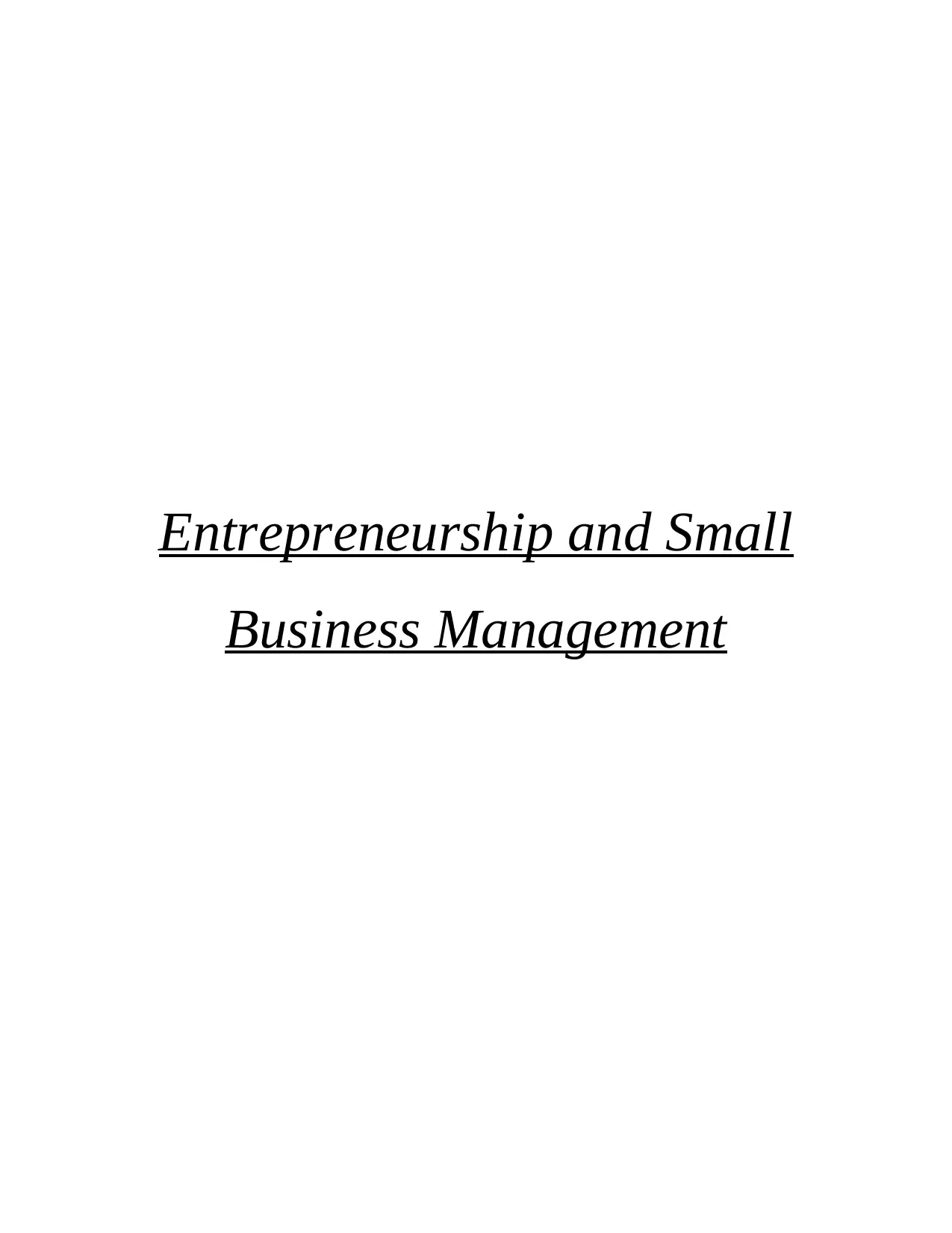
Entrepreneurship and Small
Business Management
Business Management
Secure Best Marks with AI Grader
Need help grading? Try our AI Grader for instant feedback on your assignments.
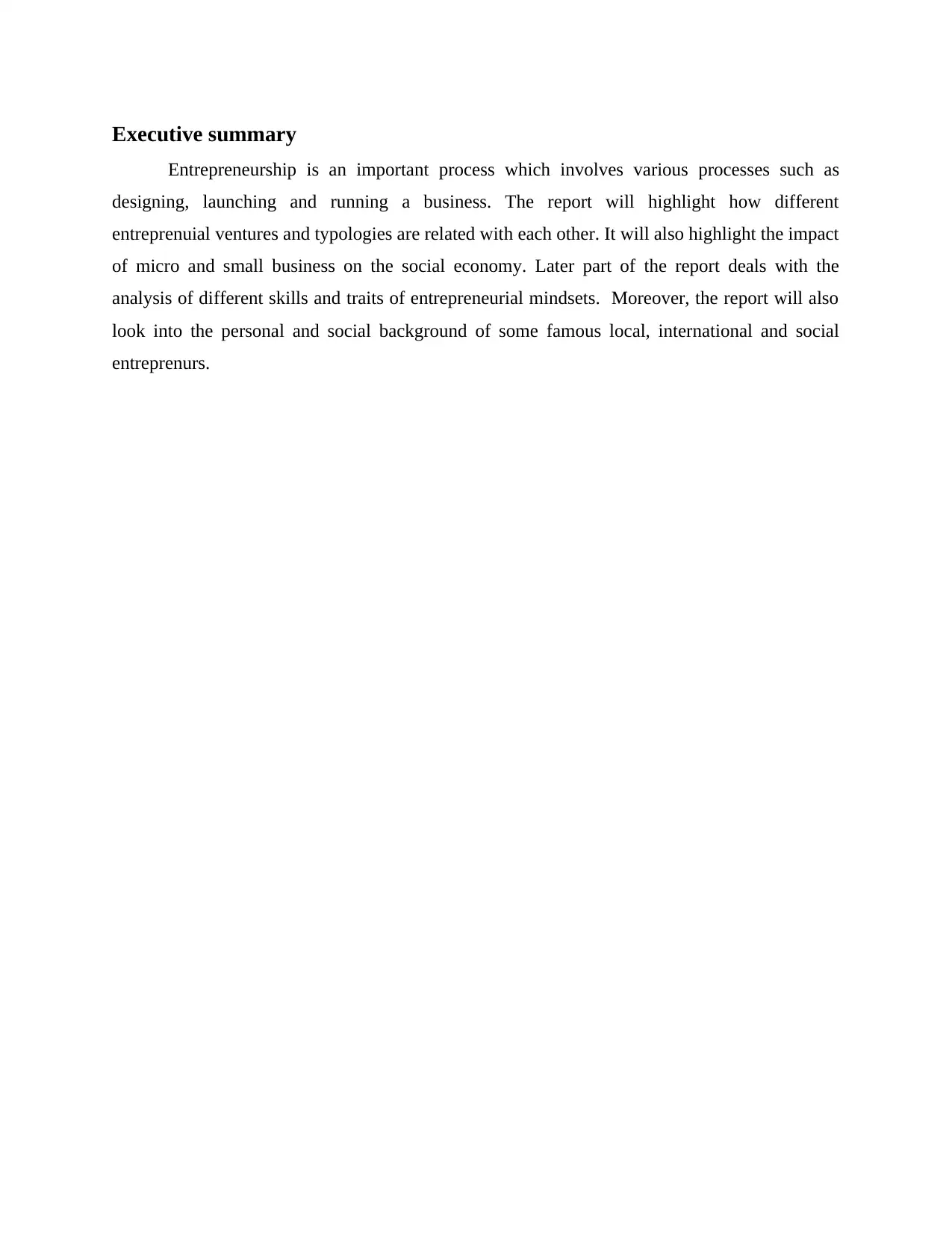
Executive summary
Entrepreneurship is an important process which involves various processes such as
designing, launching and running a business. The report will highlight how different
entreprenuial ventures and typologies are related with each other. It will also highlight the impact
of micro and small business on the social economy. Later part of the report deals with the
analysis of different skills and traits of entrepreneurial mindsets. Moreover, the report will also
look into the personal and social background of some famous local, international and social
entreprenurs.
Entrepreneurship is an important process which involves various processes such as
designing, launching and running a business. The report will highlight how different
entreprenuial ventures and typologies are related with each other. It will also highlight the impact
of micro and small business on the social economy. Later part of the report deals with the
analysis of different skills and traits of entrepreneurial mindsets. Moreover, the report will also
look into the personal and social background of some famous local, international and social
entreprenurs.
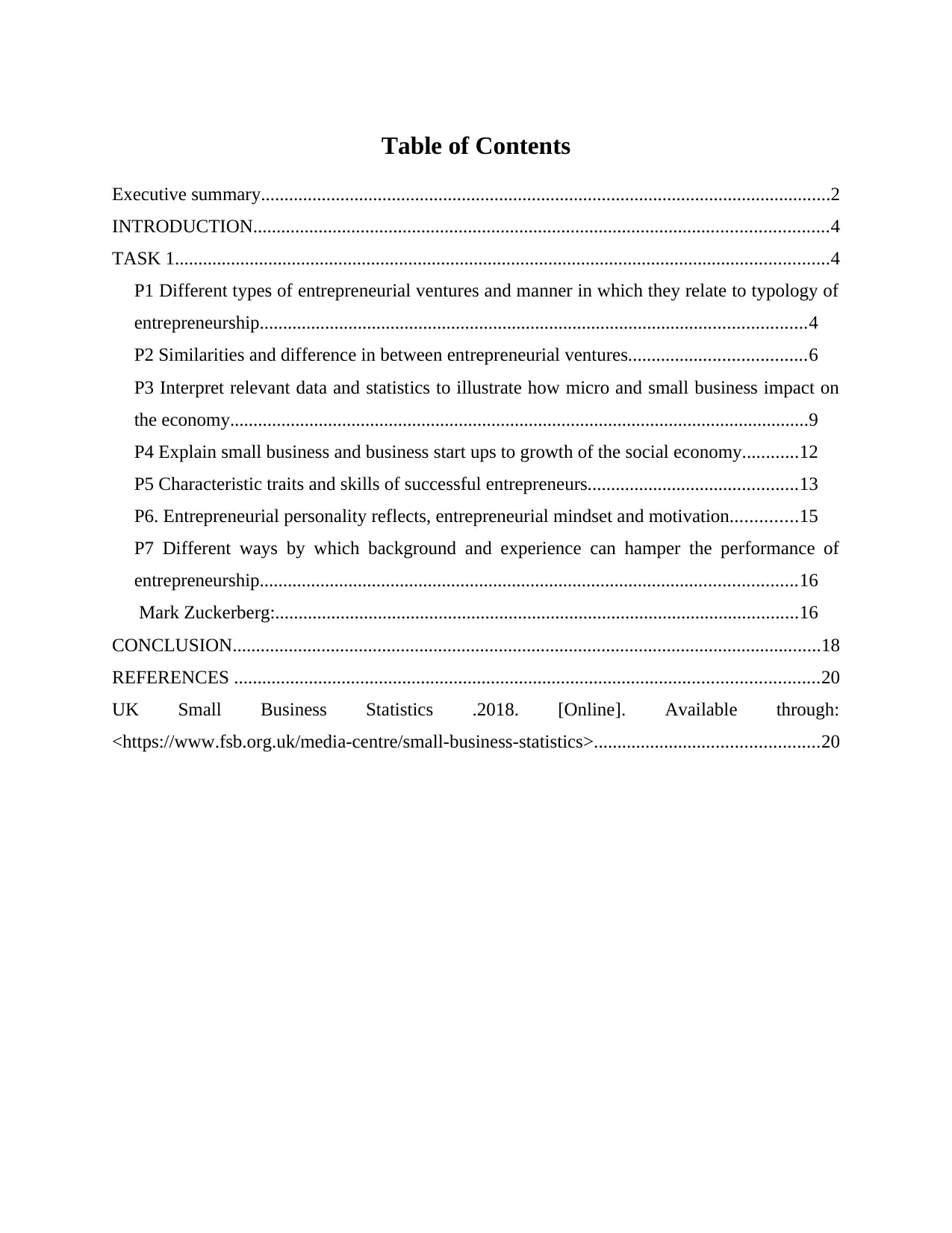
Table of Contents
Executive summary..........................................................................................................................2
INTRODUCTION...........................................................................................................................4
TASK 1............................................................................................................................................4
P1 Different types of entrepreneurial ventures and manner in which they relate to typology of
entrepreneurship.....................................................................................................................4
P2 Similarities and difference in between entrepreneurial ventures......................................6
P3 Interpret relevant data and statistics to illustrate how micro and small business impact on
the economy............................................................................................................................9
P4 Explain small business and business start ups to growth of the social economy............12
P5 Characteristic traits and skills of successful entrepreneurs.............................................13
P6. Entrepreneurial personality reflects, entrepreneurial mindset and motivation..............15
P7 Different ways by which background and experience can hamper the performance of
entrepreneurship...................................................................................................................16
Mark Zuckerberg:................................................................................................................16
CONCLUSION..............................................................................................................................18
REFERENCES .............................................................................................................................20
UK Small Business Statistics .2018. [Online]. Available through:
<https://www.fsb.org.uk/media-centre/small-business-statistics>................................................20
Executive summary..........................................................................................................................2
INTRODUCTION...........................................................................................................................4
TASK 1............................................................................................................................................4
P1 Different types of entrepreneurial ventures and manner in which they relate to typology of
entrepreneurship.....................................................................................................................4
P2 Similarities and difference in between entrepreneurial ventures......................................6
P3 Interpret relevant data and statistics to illustrate how micro and small business impact on
the economy............................................................................................................................9
P4 Explain small business and business start ups to growth of the social economy............12
P5 Characteristic traits and skills of successful entrepreneurs.............................................13
P6. Entrepreneurial personality reflects, entrepreneurial mindset and motivation..............15
P7 Different ways by which background and experience can hamper the performance of
entrepreneurship...................................................................................................................16
Mark Zuckerberg:................................................................................................................16
CONCLUSION..............................................................................................................................18
REFERENCES .............................................................................................................................20
UK Small Business Statistics .2018. [Online]. Available through:
<https://www.fsb.org.uk/media-centre/small-business-statistics>................................................20
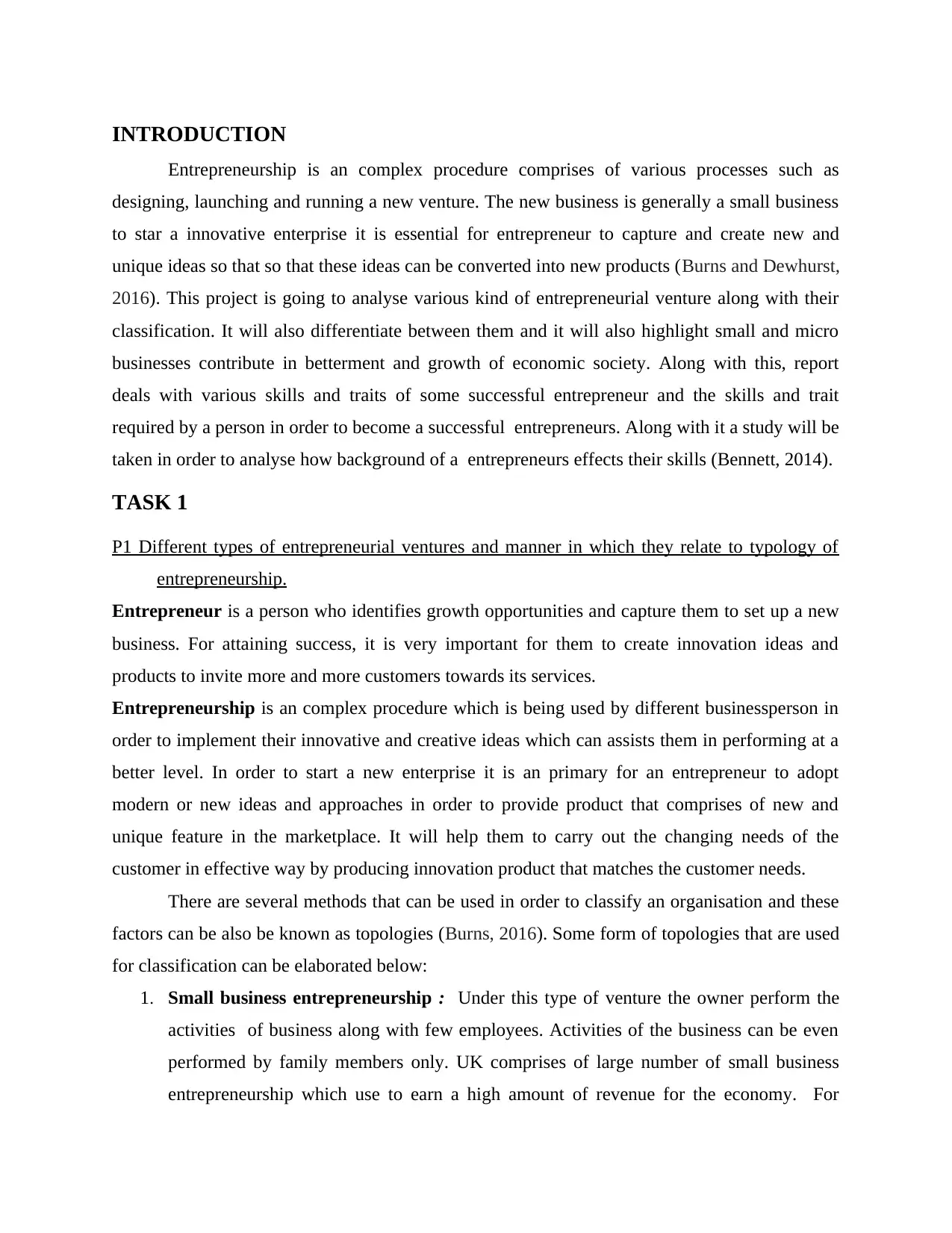
INTRODUCTION
Entrepreneurship is an complex procedure comprises of various processes such as
designing, launching and running a new venture. The new business is generally a small business
to star a innovative enterprise it is essential for entrepreneur to capture and create new and
unique ideas so that so that these ideas can be converted into new products (Burns and Dewhurst,
2016). This project is going to analyse various kind of entrepreneurial venture along with their
classification. It will also differentiate between them and it will also highlight small and micro
businesses contribute in betterment and growth of economic society. Along with this, report
deals with various skills and traits of some successful entrepreneur and the skills and trait
required by a person in order to become a successful entrepreneurs. Along with it a study will be
taken in order to analyse how background of a entrepreneurs effects their skills (Bennett, 2014).
TASK 1
P1 Different types of entrepreneurial ventures and manner in which they relate to typology of
entrepreneurship.
Entrepreneur is a person who identifies growth opportunities and capture them to set up a new
business. For attaining success, it is very important for them to create innovation ideas and
products to invite more and more customers towards its services.
Entrepreneurship is an complex procedure which is being used by different businessperson in
order to implement their innovative and creative ideas which can assists them in performing at a
better level. In order to start a new enterprise it is an primary for an entrepreneur to adopt
modern or new ideas and approaches in order to provide product that comprises of new and
unique feature in the marketplace. It will help them to carry out the changing needs of the
customer in effective way by producing innovation product that matches the customer needs.
There are several methods that can be used in order to classify an organisation and these
factors can be also be known as topologies (Burns, 2016). Some form of topologies that are used
for classification can be elaborated below:
1. Small business entrepreneurship : Under this type of venture the owner perform the
activities of business along with few employees. Activities of the business can be even
performed by family members only. UK comprises of large number of small business
entrepreneurship which use to earn a high amount of revenue for the economy. For
Entrepreneurship is an complex procedure comprises of various processes such as
designing, launching and running a new venture. The new business is generally a small business
to star a innovative enterprise it is essential for entrepreneur to capture and create new and
unique ideas so that so that these ideas can be converted into new products (Burns and Dewhurst,
2016). This project is going to analyse various kind of entrepreneurial venture along with their
classification. It will also differentiate between them and it will also highlight small and micro
businesses contribute in betterment and growth of economic society. Along with this, report
deals with various skills and traits of some successful entrepreneur and the skills and trait
required by a person in order to become a successful entrepreneurs. Along with it a study will be
taken in order to analyse how background of a entrepreneurs effects their skills (Bennett, 2014).
TASK 1
P1 Different types of entrepreneurial ventures and manner in which they relate to typology of
entrepreneurship.
Entrepreneur is a person who identifies growth opportunities and capture them to set up a new
business. For attaining success, it is very important for them to create innovation ideas and
products to invite more and more customers towards its services.
Entrepreneurship is an complex procedure which is being used by different businessperson in
order to implement their innovative and creative ideas which can assists them in performing at a
better level. In order to start a new enterprise it is an primary for an entrepreneur to adopt
modern or new ideas and approaches in order to provide product that comprises of new and
unique feature in the marketplace. It will help them to carry out the changing needs of the
customer in effective way by producing innovation product that matches the customer needs.
There are several methods that can be used in order to classify an organisation and these
factors can be also be known as topologies (Burns, 2016). Some form of topologies that are used
for classification can be elaborated below:
1. Small business entrepreneurship : Under this type of venture the owner perform the
activities of business along with few employees. Activities of the business can be even
performed by family members only. UK comprises of large number of small business
entrepreneurship which use to earn a high amount of revenue for the economy. For
Secure Best Marks with AI Grader
Need help grading? Try our AI Grader for instant feedback on your assignments.
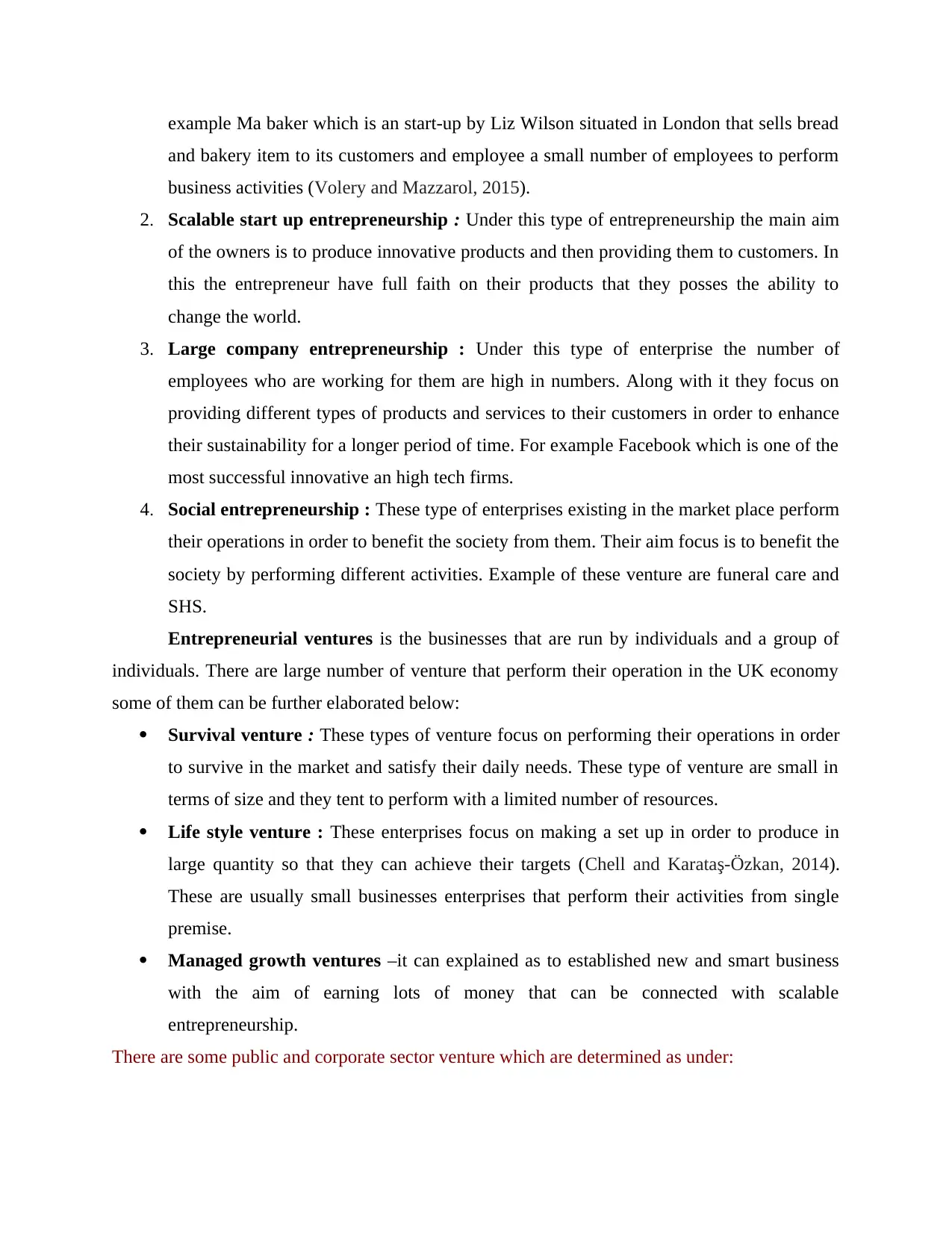
example Ma baker which is an start-up by Liz Wilson situated in London that sells bread
and bakery item to its customers and employee a small number of employees to perform
business activities (Volery and Mazzarol, 2015).
2. Scalable start up entrepreneurship : Under this type of entrepreneurship the main aim
of the owners is to produce innovative products and then providing them to customers. In
this the entrepreneur have full faith on their products that they posses the ability to
change the world.
3. Large company entrepreneurship : Under this type of enterprise the number of
employees who are working for them are high in numbers. Along with it they focus on
providing different types of products and services to their customers in order to enhance
their sustainability for a longer period of time. For example Facebook which is one of the
most successful innovative an high tech firms.
4. Social entrepreneurship : These type of enterprises existing in the market place perform
their operations in order to benefit the society from them. Their aim focus is to benefit the
society by performing different activities. Example of these venture are funeral care and
SHS.
Entrepreneurial ventures is the businesses that are run by individuals and a group of
individuals. There are large number of venture that perform their operation in the UK economy
some of them can be further elaborated below:
Survival venture : These types of venture focus on performing their operations in order
to survive in the market and satisfy their daily needs. These type of venture are small in
terms of size and they tent to perform with a limited number of resources.
Life style venture : These enterprises focus on making a set up in order to produce in
large quantity so that they can achieve their targets (Chell and Karataş-Özkan, 2014).
These are usually small businesses enterprises that perform their activities from single
premise.
Managed growth ventures –it can explained as to established new and smart business
with the aim of earning lots of money that can be connected with scalable
entrepreneurship.
There are some public and corporate sector venture which are determined as under:
and bakery item to its customers and employee a small number of employees to perform
business activities (Volery and Mazzarol, 2015).
2. Scalable start up entrepreneurship : Under this type of entrepreneurship the main aim
of the owners is to produce innovative products and then providing them to customers. In
this the entrepreneur have full faith on their products that they posses the ability to
change the world.
3. Large company entrepreneurship : Under this type of enterprise the number of
employees who are working for them are high in numbers. Along with it they focus on
providing different types of products and services to their customers in order to enhance
their sustainability for a longer period of time. For example Facebook which is one of the
most successful innovative an high tech firms.
4. Social entrepreneurship : These type of enterprises existing in the market place perform
their operations in order to benefit the society from them. Their aim focus is to benefit the
society by performing different activities. Example of these venture are funeral care and
SHS.
Entrepreneurial ventures is the businesses that are run by individuals and a group of
individuals. There are large number of venture that perform their operation in the UK economy
some of them can be further elaborated below:
Survival venture : These types of venture focus on performing their operations in order
to survive in the market and satisfy their daily needs. These type of venture are small in
terms of size and they tent to perform with a limited number of resources.
Life style venture : These enterprises focus on making a set up in order to produce in
large quantity so that they can achieve their targets (Chell and Karataş-Özkan, 2014).
These are usually small businesses enterprises that perform their activities from single
premise.
Managed growth ventures –it can explained as to established new and smart business
with the aim of earning lots of money that can be connected with scalable
entrepreneurship.
There are some public and corporate sector venture which are determined as under:
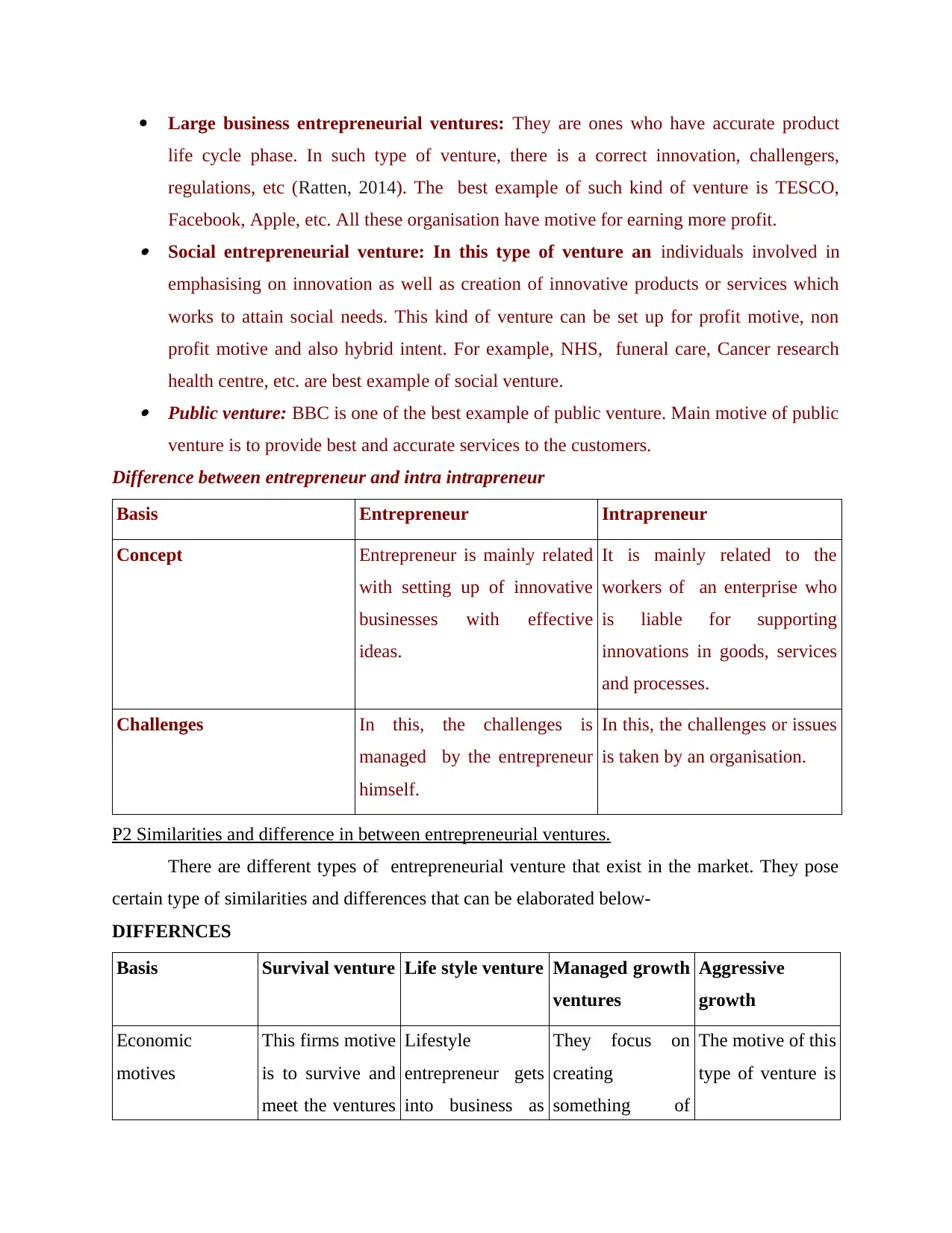
Large business entrepreneurial ventures: They are ones who have accurate product
life cycle phase. In such type of venture, there is a correct innovation, challengers,
regulations, etc (Ratten, 2014). The best example of such kind of venture is TESCO,
Facebook, Apple, etc. All these organisation have motive for earning more profit. Social entrepreneurial venture: In this type of venture an individuals involved in
emphasising on innovation as well as creation of innovative products or services which
works to attain social needs. This kind of venture can be set up for profit motive, non
profit motive and also hybrid intent. For example, NHS, funeral care, Cancer research
health centre, etc. are best example of social venture. Public venture: BBC is one of the best example of public venture. Main motive of public
venture is to provide best and accurate services to the customers.
Difference between entrepreneur and intra intrapreneur
Basis Entrepreneur Intrapreneur
Concept Entrepreneur is mainly related
with setting up of innovative
businesses with effective
ideas.
It is mainly related to the
workers of an enterprise who
is liable for supporting
innovations in goods, services
and processes.
Challenges In this, the challenges is
managed by the entrepreneur
himself.
In this, the challenges or issues
is taken by an organisation.
P2 Similarities and difference in between entrepreneurial ventures.
There are different types of entrepreneurial venture that exist in the market. They pose
certain type of similarities and differences that can be elaborated below-
DIFFERNCES
Basis Survival venture Life style venture Managed growth
ventures
Aggressive
growth
Economic
motives
This firms motive
is to survive and
meet the ventures
Lifestyle
entrepreneur gets
into business as
They focus on
creating
something of
The motive of this
type of venture is
life cycle phase. In such type of venture, there is a correct innovation, challengers,
regulations, etc (Ratten, 2014). The best example of such kind of venture is TESCO,
Facebook, Apple, etc. All these organisation have motive for earning more profit. Social entrepreneurial venture: In this type of venture an individuals involved in
emphasising on innovation as well as creation of innovative products or services which
works to attain social needs. This kind of venture can be set up for profit motive, non
profit motive and also hybrid intent. For example, NHS, funeral care, Cancer research
health centre, etc. are best example of social venture. Public venture: BBC is one of the best example of public venture. Main motive of public
venture is to provide best and accurate services to the customers.
Difference between entrepreneur and intra intrapreneur
Basis Entrepreneur Intrapreneur
Concept Entrepreneur is mainly related
with setting up of innovative
businesses with effective
ideas.
It is mainly related to the
workers of an enterprise who
is liable for supporting
innovations in goods, services
and processes.
Challenges In this, the challenges is
managed by the entrepreneur
himself.
In this, the challenges or issues
is taken by an organisation.
P2 Similarities and difference in between entrepreneurial ventures.
There are different types of entrepreneurial venture that exist in the market. They pose
certain type of similarities and differences that can be elaborated below-
DIFFERNCES
Basis Survival venture Life style venture Managed growth
ventures
Aggressive
growth
Economic
motives
This firms motive
is to survive and
meet the ventures
Lifestyle
entrepreneur gets
into business as
They focus on
creating
something of
The motive of this
type of venture is
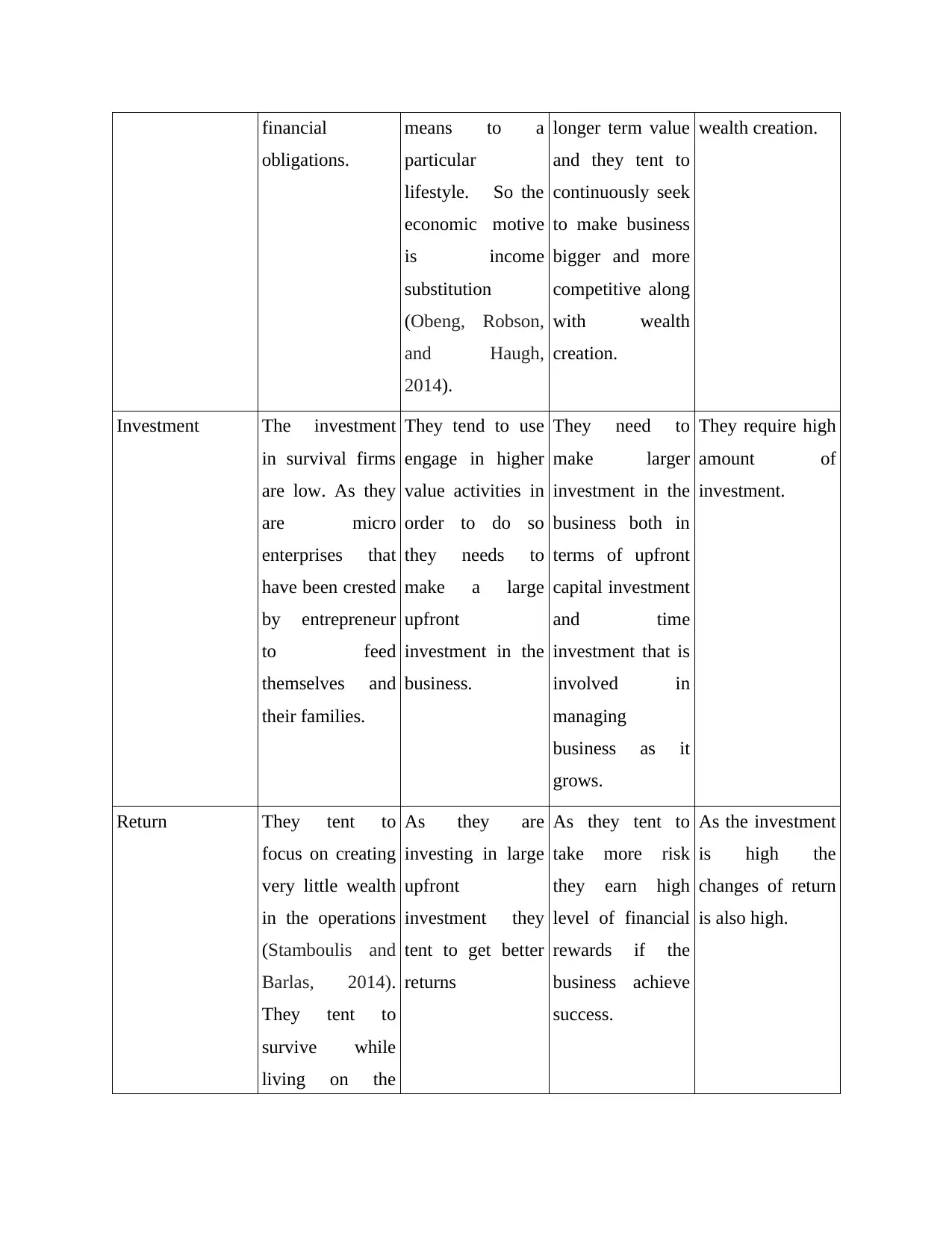
financial
obligations.
means to a
particular
lifestyle. So the
economic motive
is income
substitution
(Obeng, Robson,
and Haugh,
2014).
longer term value
and they tent to
continuously seek
to make business
bigger and more
competitive along
with wealth
creation.
wealth creation.
Investment The investment
in survival firms
are low. As they
are micro
enterprises that
have been crested
by entrepreneur
to feed
themselves and
their families.
They tend to use
engage in higher
value activities in
order to do so
they needs to
make a large
upfront
investment in the
business.
They need to
make larger
investment in the
business both in
terms of upfront
capital investment
and time
investment that is
involved in
managing
business as it
grows.
They require high
amount of
investment.
Return They tent to
focus on creating
very little wealth
in the operations
(Stamboulis and
Barlas, 2014).
They tent to
survive while
living on the
As they are
investing in large
upfront
investment they
tent to get better
returns
As they tent to
take more risk
they earn high
level of financial
rewards if the
business achieve
success.
As the investment
is high the
changes of return
is also high.
obligations.
means to a
particular
lifestyle. So the
economic motive
is income
substitution
(Obeng, Robson,
and Haugh,
2014).
longer term value
and they tent to
continuously seek
to make business
bigger and more
competitive along
with wealth
creation.
wealth creation.
Investment The investment
in survival firms
are low. As they
are micro
enterprises that
have been crested
by entrepreneur
to feed
themselves and
their families.
They tend to use
engage in higher
value activities in
order to do so
they needs to
make a large
upfront
investment in the
business.
They need to
make larger
investment in the
business both in
terms of upfront
capital investment
and time
investment that is
involved in
managing
business as it
grows.
They require high
amount of
investment.
Return They tent to
focus on creating
very little wealth
in the operations
(Stamboulis and
Barlas, 2014).
They tent to
survive while
living on the
As they are
investing in large
upfront
investment they
tent to get better
returns
As they tent to
take more risk
they earn high
level of financial
rewards if the
business achieve
success.
As the investment
is high the
changes of return
is also high.
Paraphrase This Document
Need a fresh take? Get an instant paraphrase of this document with our AI Paraphraser
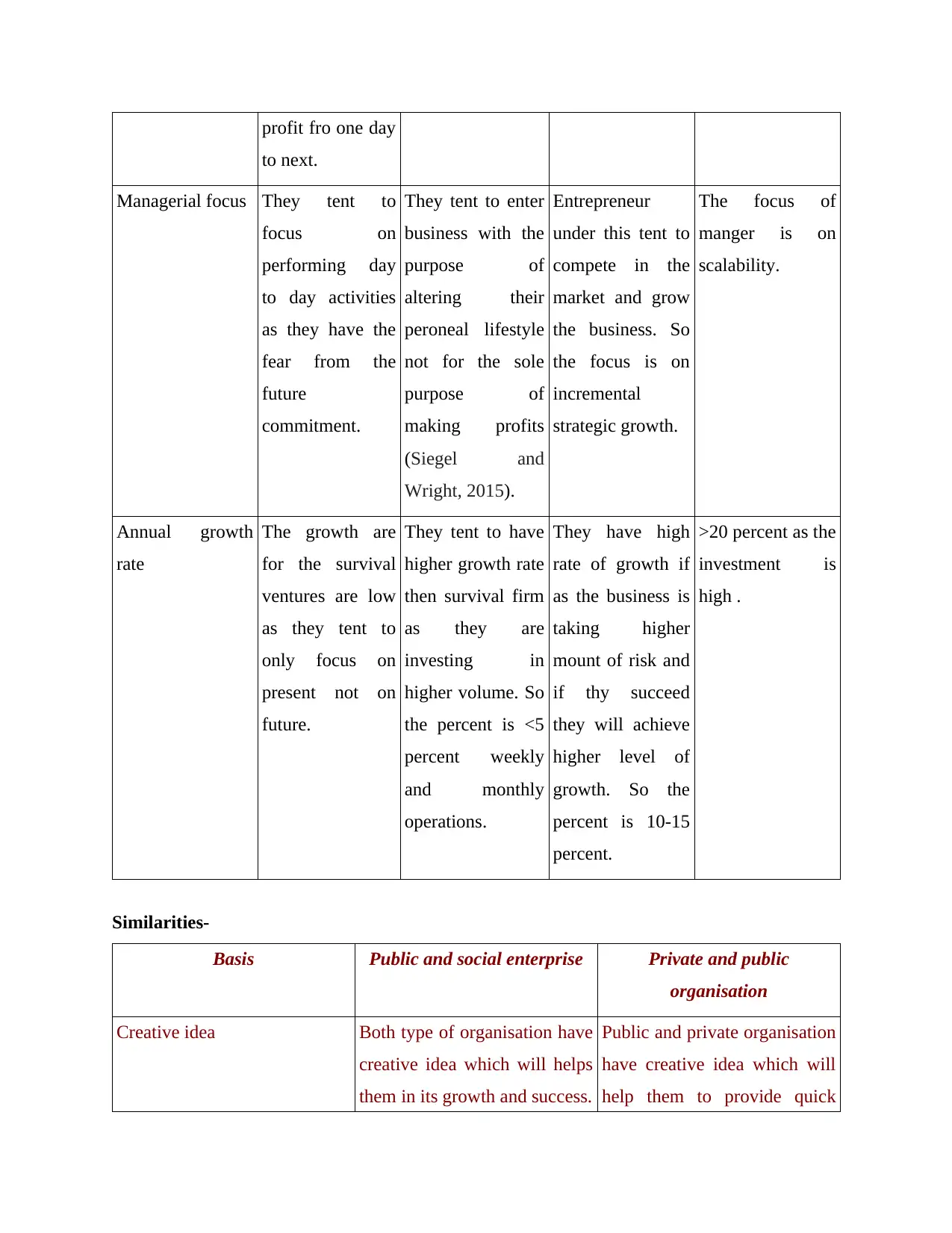
profit fro one day
to next.
Managerial focus They tent to
focus on
performing day
to day activities
as they have the
fear from the
future
commitment.
They tent to enter
business with the
purpose of
altering their
peroneal lifestyle
not for the sole
purpose of
making profits
(Siegel and
Wright, 2015).
Entrepreneur
under this tent to
compete in the
market and grow
the business. So
the focus is on
incremental
strategic growth.
The focus of
manger is on
scalability.
Annual growth
rate
The growth are
for the survival
ventures are low
as they tent to
only focus on
present not on
future.
They tent to have
higher growth rate
then survival firm
as they are
investing in
higher volume. So
the percent is <5
percent weekly
and monthly
operations.
They have high
rate of growth if
as the business is
taking higher
mount of risk and
if thy succeed
they will achieve
higher level of
growth. So the
percent is 10-15
percent.
>20 percent as the
investment is
high .
Similarities-
Basis Public and social enterprise Private and public
organisation
Creative idea Both type of organisation have
creative idea which will helps
them in its growth and success.
Public and private organisation
have creative idea which will
help them to provide quick
to next.
Managerial focus They tent to
focus on
performing day
to day activities
as they have the
fear from the
future
commitment.
They tent to enter
business with the
purpose of
altering their
peroneal lifestyle
not for the sole
purpose of
making profits
(Siegel and
Wright, 2015).
Entrepreneur
under this tent to
compete in the
market and grow
the business. So
the focus is on
incremental
strategic growth.
The focus of
manger is on
scalability.
Annual growth
rate
The growth are
for the survival
ventures are low
as they tent to
only focus on
present not on
future.
They tent to have
higher growth rate
then survival firm
as they are
investing in
higher volume. So
the percent is <5
percent weekly
and monthly
operations.
They have high
rate of growth if
as the business is
taking higher
mount of risk and
if thy succeed
they will achieve
higher level of
growth. So the
percent is 10-15
percent.
>20 percent as the
investment is
high .
Similarities-
Basis Public and social enterprise Private and public
organisation
Creative idea Both type of organisation have
creative idea which will helps
them in its growth and success.
Public and private organisation
have creative idea which will
help them to provide quick
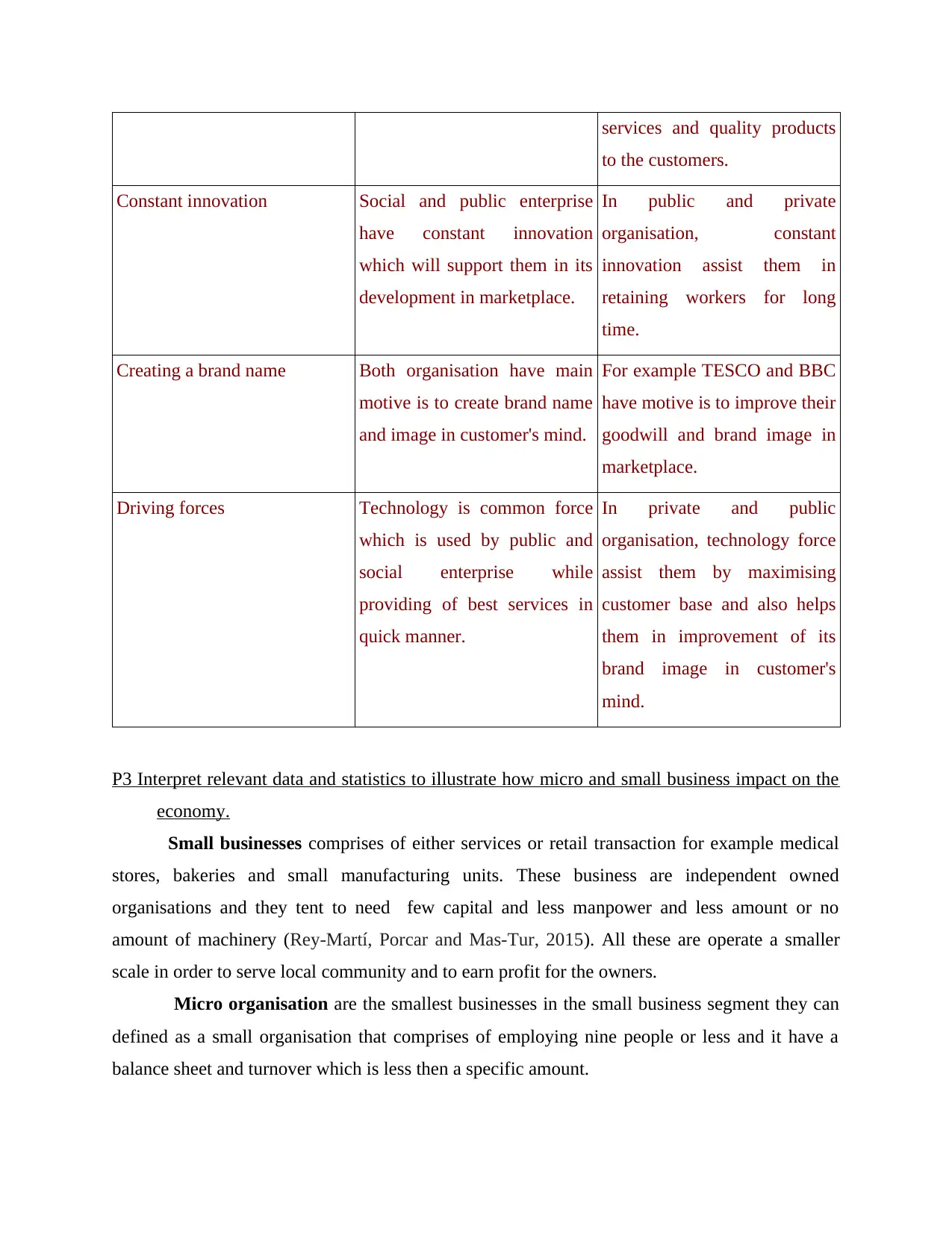
services and quality products
to the customers.
Constant innovation Social and public enterprise
have constant innovation
which will support them in its
development in marketplace.
In public and private
organisation, constant
innovation assist them in
retaining workers for long
time.
Creating a brand name Both organisation have main
motive is to create brand name
and image in customer's mind.
For example TESCO and BBC
have motive is to improve their
goodwill and brand image in
marketplace.
Driving forces Technology is common force
which is used by public and
social enterprise while
providing of best services in
quick manner.
In private and public
organisation, technology force
assist them by maximising
customer base and also helps
them in improvement of its
brand image in customer's
mind.
P3 Interpret relevant data and statistics to illustrate how micro and small business impact on the
economy.
Small businesses comprises of either services or retail transaction for example medical
stores, bakeries and small manufacturing units. These business are independent owned
organisations and they tent to need few capital and less manpower and less amount or no
amount of machinery (Rey-Martí, Porcar and Mas-Tur, 2015). All these are operate a smaller
scale in order to serve local community and to earn profit for the owners.
Micro organisation are the smallest businesses in the small business segment they can
defined as a small organisation that comprises of employing nine people or less and it have a
balance sheet and turnover which is less then a specific amount.
to the customers.
Constant innovation Social and public enterprise
have constant innovation
which will support them in its
development in marketplace.
In public and private
organisation, constant
innovation assist them in
retaining workers for long
time.
Creating a brand name Both organisation have main
motive is to create brand name
and image in customer's mind.
For example TESCO and BBC
have motive is to improve their
goodwill and brand image in
marketplace.
Driving forces Technology is common force
which is used by public and
social enterprise while
providing of best services in
quick manner.
In private and public
organisation, technology force
assist them by maximising
customer base and also helps
them in improvement of its
brand image in customer's
mind.
P3 Interpret relevant data and statistics to illustrate how micro and small business impact on the
economy.
Small businesses comprises of either services or retail transaction for example medical
stores, bakeries and small manufacturing units. These business are independent owned
organisations and they tent to need few capital and less manpower and less amount or no
amount of machinery (Rey-Martí, Porcar and Mas-Tur, 2015). All these are operate a smaller
scale in order to serve local community and to earn profit for the owners.
Micro organisation are the smallest businesses in the small business segment they can
defined as a small organisation that comprises of employing nine people or less and it have a
balance sheet and turnover which is less then a specific amount.
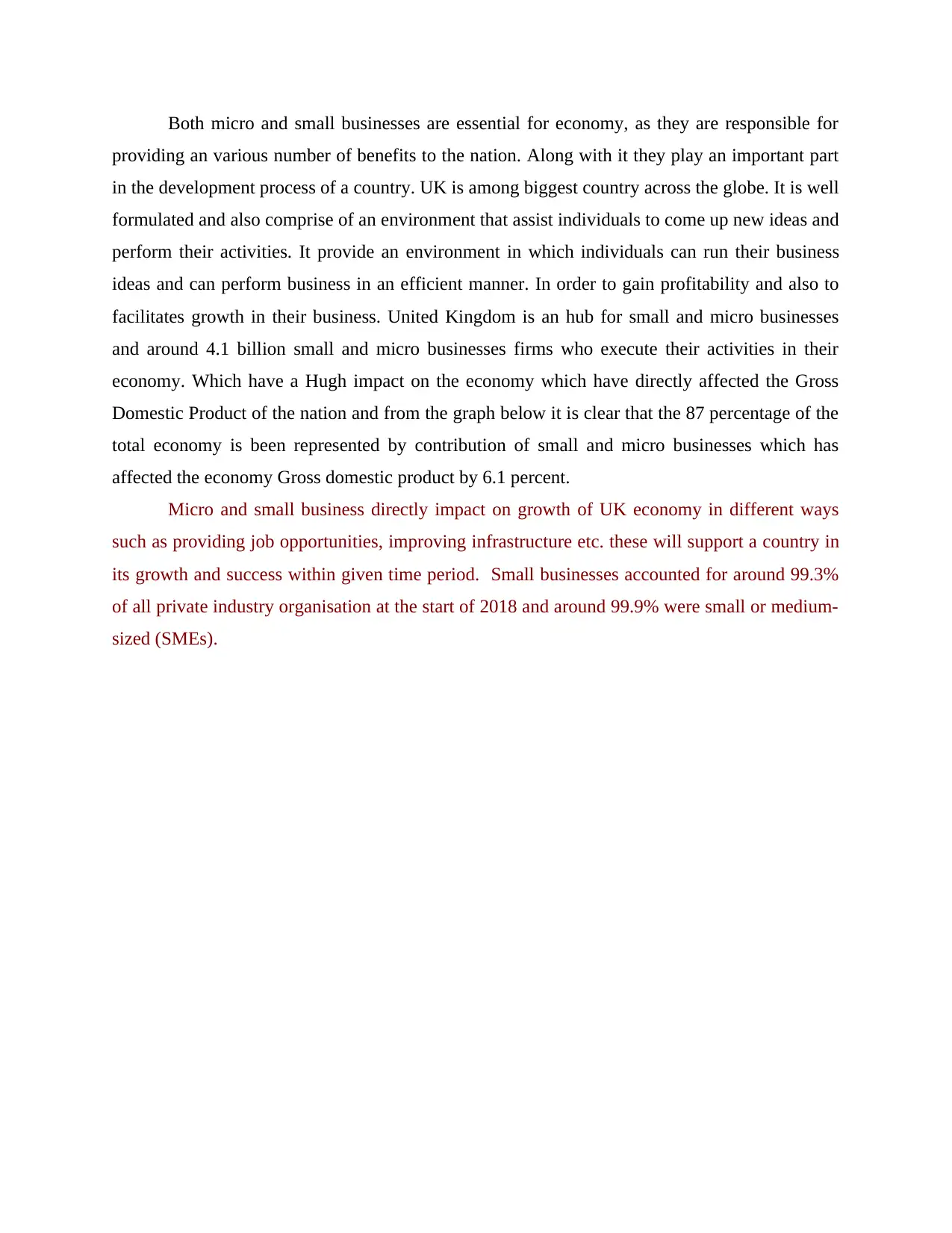
Both micro and small businesses are essential for economy, as they are responsible for
providing an various number of benefits to the nation. Along with it they play an important part
in the development process of a country. UK is among biggest country across the globe. It is well
formulated and also comprise of an environment that assist individuals to come up new ideas and
perform their activities. It provide an environment in which individuals can run their business
ideas and can perform business in an efficient manner. In order to gain profitability and also to
facilitates growth in their business. United Kingdom is an hub for small and micro businesses
and around 4.1 billion small and micro businesses firms who execute their activities in their
economy. Which have a Hugh impact on the economy which have directly affected the Gross
Domestic Product of the nation and from the graph below it is clear that the 87 percentage of the
total economy is been represented by contribution of small and micro businesses which has
affected the economy Gross domestic product by 6.1 percent.
Micro and small business directly impact on growth of UK economy in different ways
such as providing job opportunities, improving infrastructure etc. these will support a country in
its growth and success within given time period. Small businesses accounted for around 99.3%
of all private industry organisation at the start of 2018 and around 99.9% were small or medium-
sized (SMEs).
providing an various number of benefits to the nation. Along with it they play an important part
in the development process of a country. UK is among biggest country across the globe. It is well
formulated and also comprise of an environment that assist individuals to come up new ideas and
perform their activities. It provide an environment in which individuals can run their business
ideas and can perform business in an efficient manner. In order to gain profitability and also to
facilitates growth in their business. United Kingdom is an hub for small and micro businesses
and around 4.1 billion small and micro businesses firms who execute their activities in their
economy. Which have a Hugh impact on the economy which have directly affected the Gross
Domestic Product of the nation and from the graph below it is clear that the 87 percentage of the
total economy is been represented by contribution of small and micro businesses which has
affected the economy Gross domestic product by 6.1 percent.
Micro and small business directly impact on growth of UK economy in different ways
such as providing job opportunities, improving infrastructure etc. these will support a country in
its growth and success within given time period. Small businesses accounted for around 99.3%
of all private industry organisation at the start of 2018 and around 99.9% were small or medium-
sized (SMEs).
Secure Best Marks with AI Grader
Need help grading? Try our AI Grader for instant feedback on your assignments.
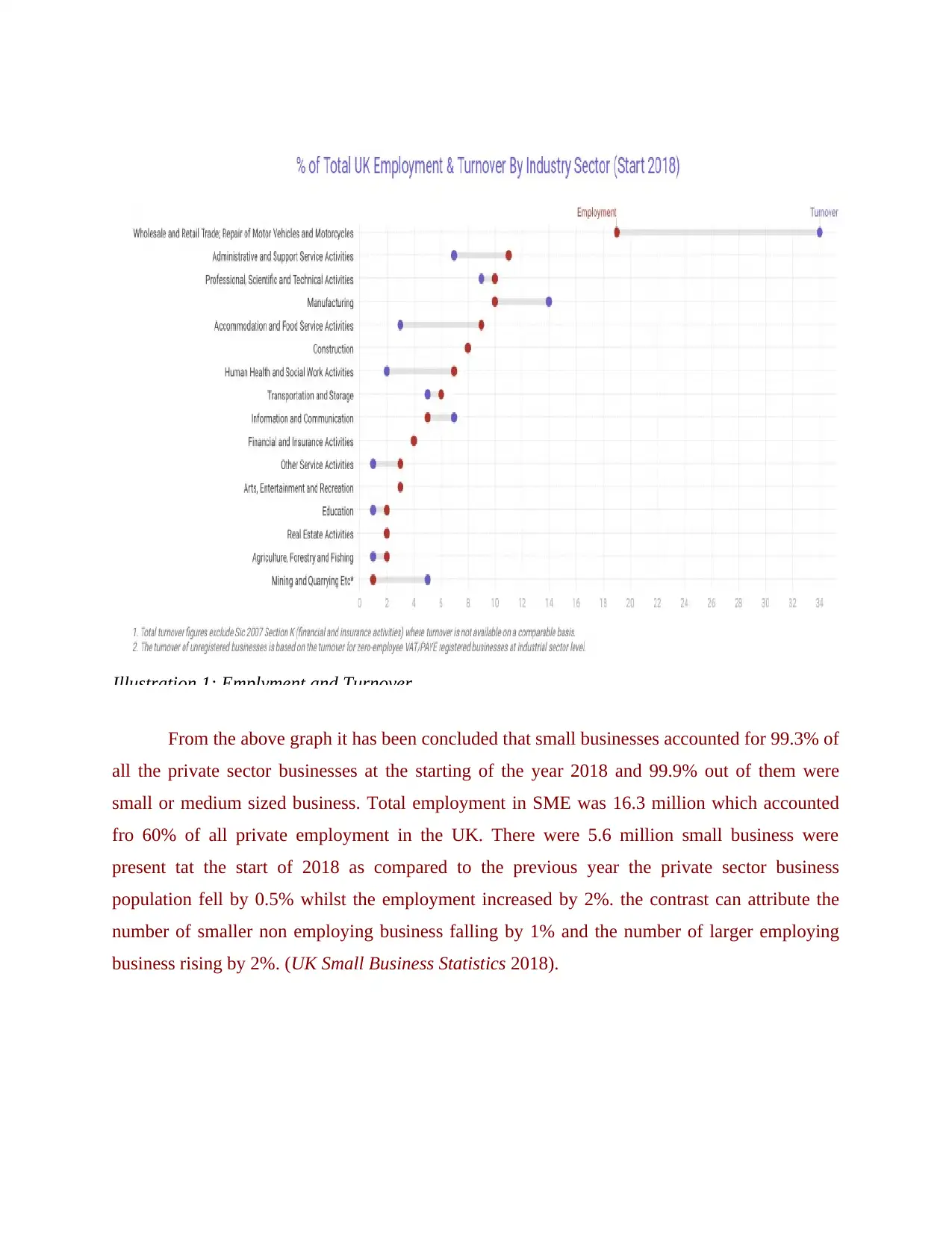
From the above graph it has been concluded that small businesses accounted for 99.3% of
all the private sector businesses at the starting of the year 2018 and 99.9% out of them were
small or medium sized business. Total employment in SME was 16.3 million which accounted
fro 60% of all private employment in the UK. There were 5.6 million small business were
present tat the start of 2018 as compared to the previous year the private sector business
population fell by 0.5% whilst the employment increased by 2%. the contrast can attribute the
number of smaller non employing business falling by 1% and the number of larger employing
business rising by 2%. (UK Small Business Statistics 2018).
Illustration 1: Emplyment and Turnover
all the private sector businesses at the starting of the year 2018 and 99.9% out of them were
small or medium sized business. Total employment in SME was 16.3 million which accounted
fro 60% of all private employment in the UK. There were 5.6 million small business were
present tat the start of 2018 as compared to the previous year the private sector business
population fell by 0.5% whilst the employment increased by 2%. the contrast can attribute the
number of smaller non employing business falling by 1% and the number of larger employing
business rising by 2%. (UK Small Business Statistics 2018).
Illustration 1: Emplyment and Turnover
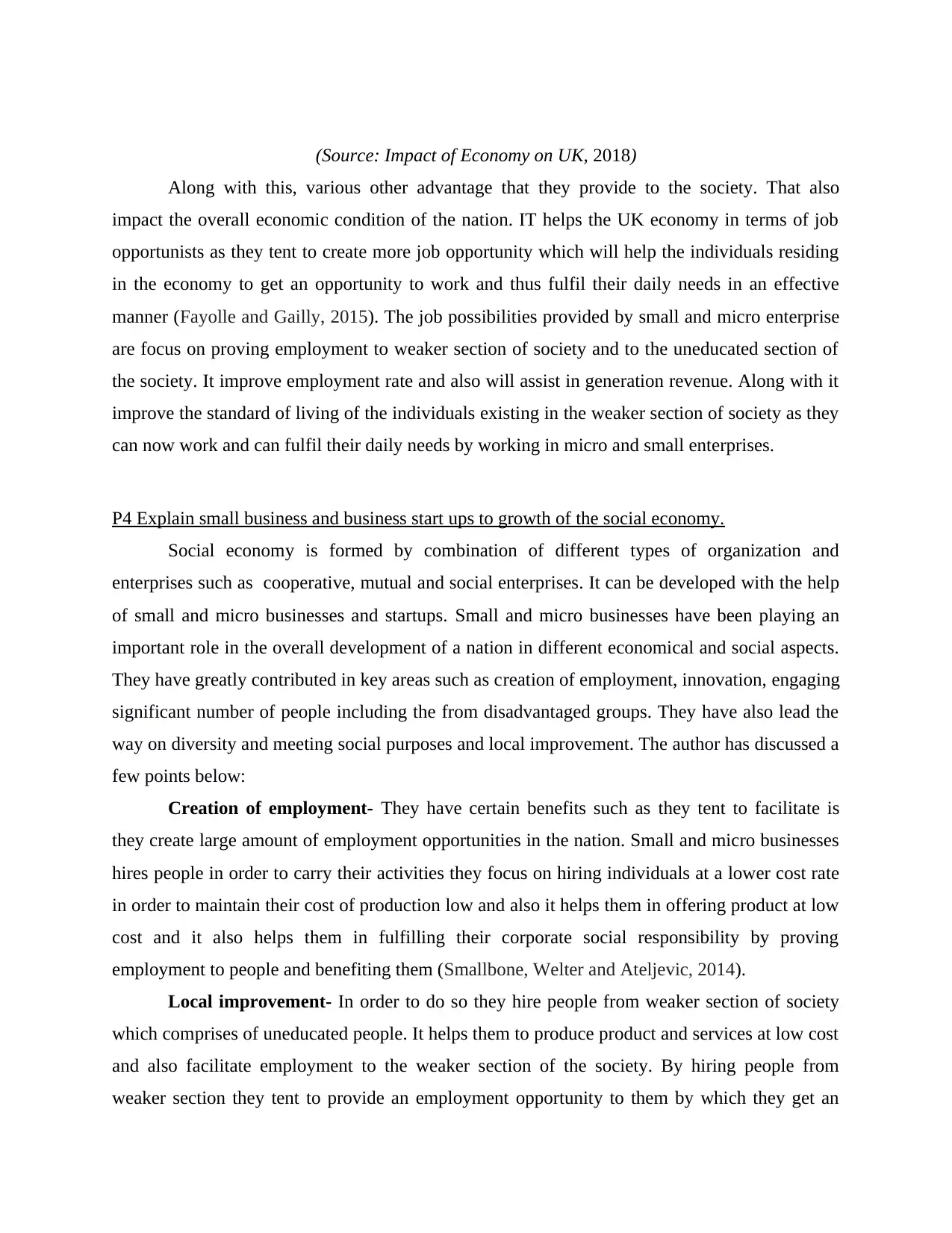
(Source: Impact of Economy on UK, 2018)
Along with this, various other advantage that they provide to the society. That also
impact the overall economic condition of the nation. IT helps the UK economy in terms of job
opportunists as they tent to create more job opportunity which will help the individuals residing
in the economy to get an opportunity to work and thus fulfil their daily needs in an effective
manner (Fayolle and Gailly, 2015). The job possibilities provided by small and micro enterprise
are focus on proving employment to weaker section of society and to the uneducated section of
the society. It improve employment rate and also will assist in generation revenue. Along with it
improve the standard of living of the individuals existing in the weaker section of society as they
can now work and can fulfil their daily needs by working in micro and small enterprises.
P4 Explain small business and business start ups to growth of the social economy.
Social economy is formed by combination of different types of organization and
enterprises such as cooperative, mutual and social enterprises. It can be developed with the help
of small and micro businesses and startups. Small and micro businesses have been playing an
important role in the overall development of a nation in different economical and social aspects.
They have greatly contributed in key areas such as creation of employment, innovation, engaging
significant number of people including the from disadvantaged groups. They have also lead the
way on diversity and meeting social purposes and local improvement. The author has discussed a
few points below:
Creation of employment- They have certain benefits such as they tent to facilitate is
they create large amount of employment opportunities in the nation. Small and micro businesses
hires people in order to carry their activities they focus on hiring individuals at a lower cost rate
in order to maintain their cost of production low and also it helps them in offering product at low
cost and it also helps them in fulfilling their corporate social responsibility by proving
employment to people and benefiting them (Smallbone, Welter and Ateljevic, 2014).
Local improvement- In order to do so they hire people from weaker section of society
which comprises of uneducated people. It helps them to produce product and services at low cost
and also facilitate employment to the weaker section of the society. By hiring people from
weaker section they tent to provide an employment opportunity to them by which they get an
Along with this, various other advantage that they provide to the society. That also
impact the overall economic condition of the nation. IT helps the UK economy in terms of job
opportunists as they tent to create more job opportunity which will help the individuals residing
in the economy to get an opportunity to work and thus fulfil their daily needs in an effective
manner (Fayolle and Gailly, 2015). The job possibilities provided by small and micro enterprise
are focus on proving employment to weaker section of society and to the uneducated section of
the society. It improve employment rate and also will assist in generation revenue. Along with it
improve the standard of living of the individuals existing in the weaker section of society as they
can now work and can fulfil their daily needs by working in micro and small enterprises.
P4 Explain small business and business start ups to growth of the social economy.
Social economy is formed by combination of different types of organization and
enterprises such as cooperative, mutual and social enterprises. It can be developed with the help
of small and micro businesses and startups. Small and micro businesses have been playing an
important role in the overall development of a nation in different economical and social aspects.
They have greatly contributed in key areas such as creation of employment, innovation, engaging
significant number of people including the from disadvantaged groups. They have also lead the
way on diversity and meeting social purposes and local improvement. The author has discussed a
few points below:
Creation of employment- They have certain benefits such as they tent to facilitate is
they create large amount of employment opportunities in the nation. Small and micro businesses
hires people in order to carry their activities they focus on hiring individuals at a lower cost rate
in order to maintain their cost of production low and also it helps them in offering product at low
cost and it also helps them in fulfilling their corporate social responsibility by proving
employment to people and benefiting them (Smallbone, Welter and Ateljevic, 2014).
Local improvement- In order to do so they hire people from weaker section of society
which comprises of uneducated people. It helps them to produce product and services at low cost
and also facilitate employment to the weaker section of the society. By hiring people from
weaker section they tent to provide an employment opportunity to them by which they get an
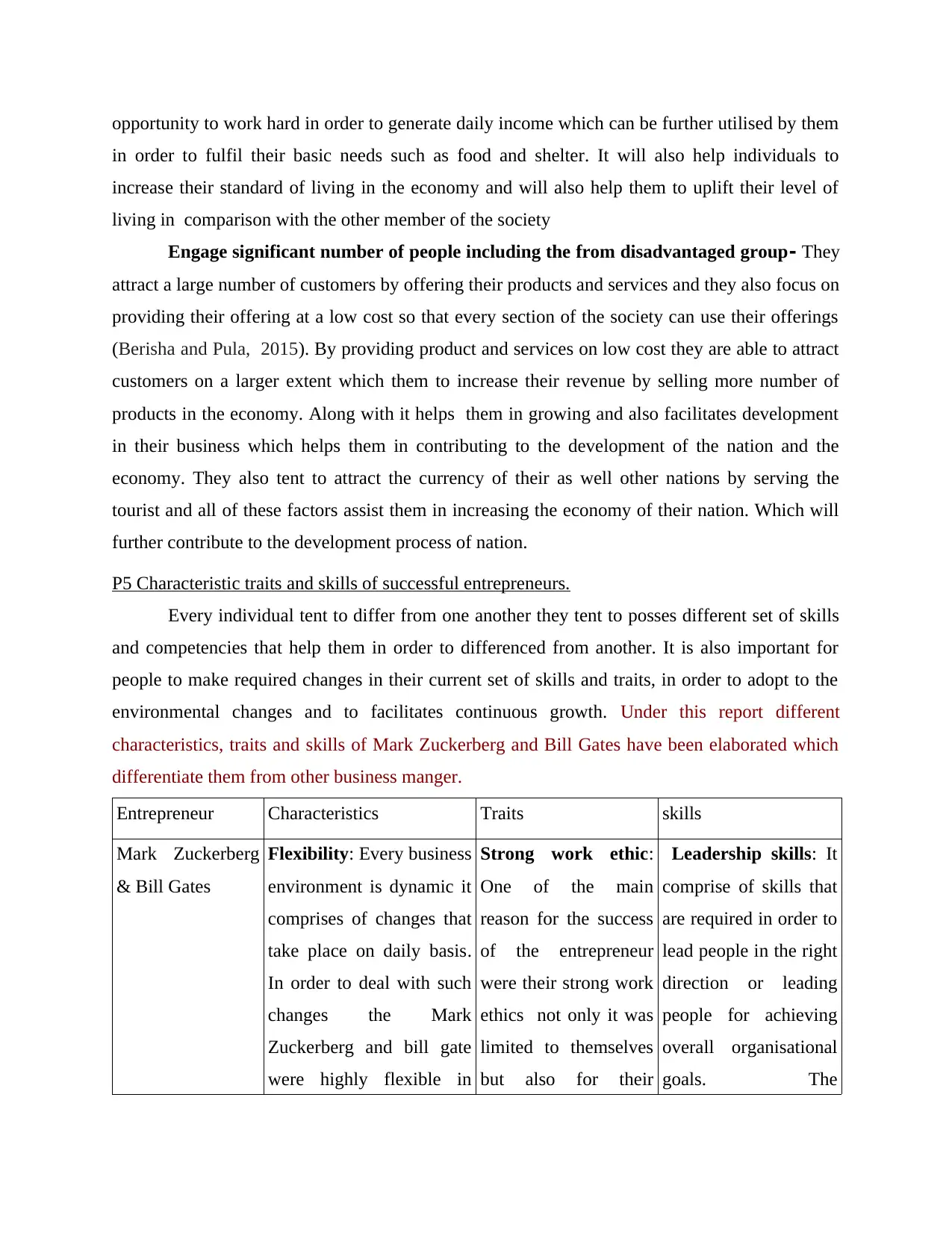
opportunity to work hard in order to generate daily income which can be further utilised by them
in order to fulfil their basic needs such as food and shelter. It will also help individuals to
increase their standard of living in the economy and will also help them to uplift their level of
living in comparison with the other member of the society
Engage significant number of people including the from disadvantaged group- They
attract a large number of customers by offering their products and services and they also focus on
providing their offering at a low cost so that every section of the society can use their offerings
(Berisha and Pula, 2015). By providing product and services on low cost they are able to attract
customers on a larger extent which them to increase their revenue by selling more number of
products in the economy. Along with it helps them in growing and also facilitates development
in their business which helps them in contributing to the development of the nation and the
economy. They also tent to attract the currency of their as well other nations by serving the
tourist and all of these factors assist them in increasing the economy of their nation. Which will
further contribute to the development process of nation.
P5 Characteristic traits and skills of successful entrepreneurs.
Every individual tent to differ from one another they tent to posses different set of skills
and competencies that help them in order to differenced from another. It is also important for
people to make required changes in their current set of skills and traits, in order to adopt to the
environmental changes and to facilitates continuous growth. Under this report different
characteristics, traits and skills of Mark Zuckerberg and Bill Gates have been elaborated which
differentiate them from other business manger.
Entrepreneur Characteristics Traits skills
Mark Zuckerberg
& Bill Gates
Flexibility: Every business
environment is dynamic it
comprises of changes that
take place on daily basis.
In order to deal with such
changes the Mark
Zuckerberg and bill gate
were highly flexible in
Strong work ethic:
One of the main
reason for the success
of the entrepreneur
were their strong work
ethics not only it was
limited to themselves
but also for their
Leadership skills: It
comprise of skills that
are required in order to
lead people in the right
direction or leading
people for achieving
overall organisational
goals. The
in order to fulfil their basic needs such as food and shelter. It will also help individuals to
increase their standard of living in the economy and will also help them to uplift their level of
living in comparison with the other member of the society
Engage significant number of people including the from disadvantaged group- They
attract a large number of customers by offering their products and services and they also focus on
providing their offering at a low cost so that every section of the society can use their offerings
(Berisha and Pula, 2015). By providing product and services on low cost they are able to attract
customers on a larger extent which them to increase their revenue by selling more number of
products in the economy. Along with it helps them in growing and also facilitates development
in their business which helps them in contributing to the development of the nation and the
economy. They also tent to attract the currency of their as well other nations by serving the
tourist and all of these factors assist them in increasing the economy of their nation. Which will
further contribute to the development process of nation.
P5 Characteristic traits and skills of successful entrepreneurs.
Every individual tent to differ from one another they tent to posses different set of skills
and competencies that help them in order to differenced from another. It is also important for
people to make required changes in their current set of skills and traits, in order to adopt to the
environmental changes and to facilitates continuous growth. Under this report different
characteristics, traits and skills of Mark Zuckerberg and Bill Gates have been elaborated which
differentiate them from other business manger.
Entrepreneur Characteristics Traits skills
Mark Zuckerberg
& Bill Gates
Flexibility: Every business
environment is dynamic it
comprises of changes that
take place on daily basis.
In order to deal with such
changes the Mark
Zuckerberg and bill gate
were highly flexible in
Strong work ethic:
One of the main
reason for the success
of the entrepreneur
were their strong work
ethics not only it was
limited to themselves
but also for their
Leadership skills: It
comprise of skills that
are required in order to
lead people in the right
direction or leading
people for achieving
overall organisational
goals. The
Paraphrase This Document
Need a fresh take? Get an instant paraphrase of this document with our AI Paraphraser
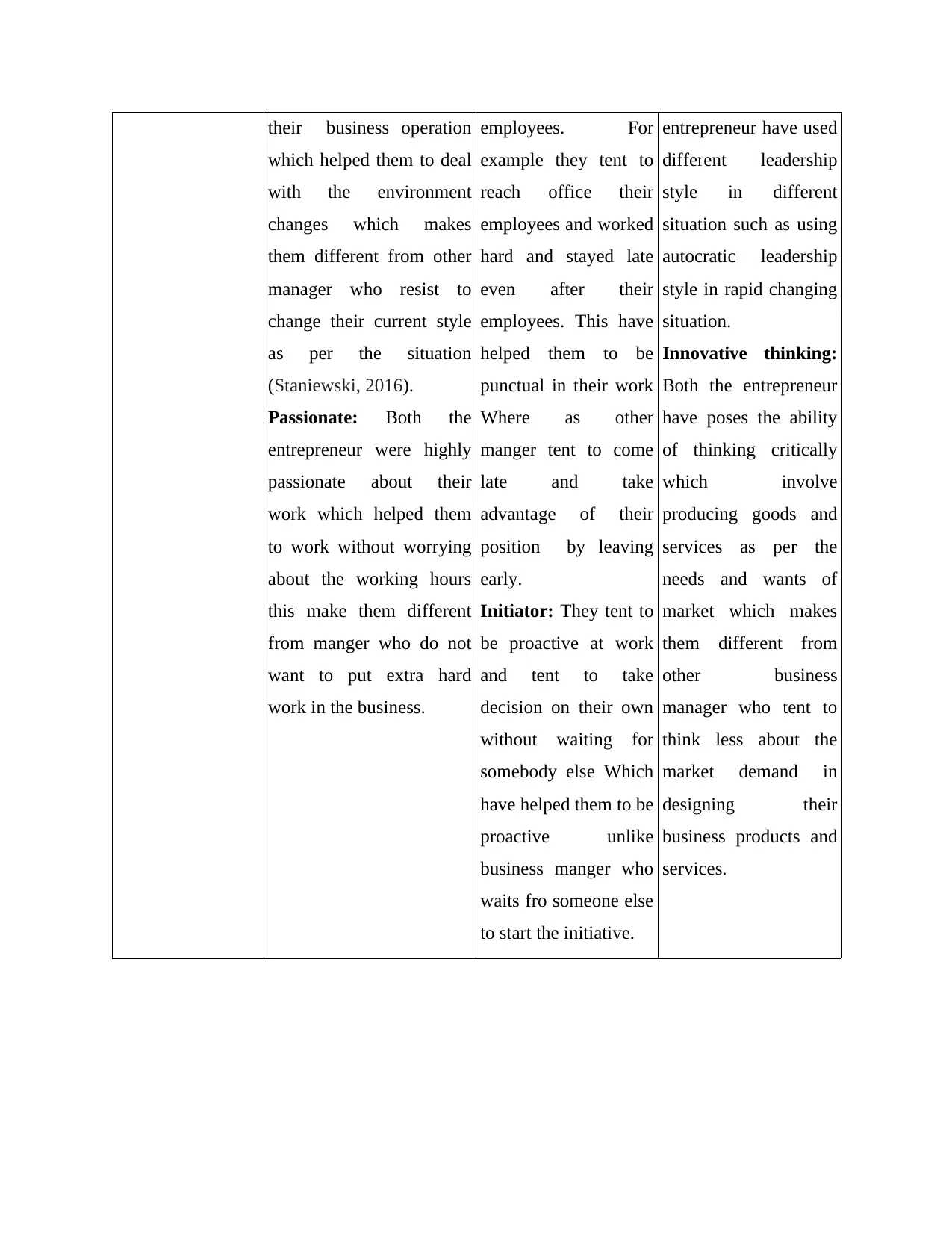
their business operation
which helped them to deal
with the environment
changes which makes
them different from other
manager who resist to
change their current style
as per the situation
(Staniewski, 2016).
Passionate: Both the
entrepreneur were highly
passionate about their
work which helped them
to work without worrying
about the working hours
this make them different
from manger who do not
want to put extra hard
work in the business.
employees. For
example they tent to
reach office their
employees and worked
hard and stayed late
even after their
employees. This have
helped them to be
punctual in their work
Where as other
manger tent to come
late and take
advantage of their
position by leaving
early.
Initiator: They tent to
be proactive at work
and tent to take
decision on their own
without waiting for
somebody else Which
have helped them to be
proactive unlike
business manger who
waits fro someone else
to start the initiative.
entrepreneur have used
different leadership
style in different
situation such as using
autocratic leadership
style in rapid changing
situation.
Innovative thinking:
Both the entrepreneur
have poses the ability
of thinking critically
which involve
producing goods and
services as per the
needs and wants of
market which makes
them different from
other business
manager who tent to
think less about the
market demand in
designing their
business products and
services.
which helped them to deal
with the environment
changes which makes
them different from other
manager who resist to
change their current style
as per the situation
(Staniewski, 2016).
Passionate: Both the
entrepreneur were highly
passionate about their
work which helped them
to work without worrying
about the working hours
this make them different
from manger who do not
want to put extra hard
work in the business.
employees. For
example they tent to
reach office their
employees and worked
hard and stayed late
even after their
employees. This have
helped them to be
punctual in their work
Where as other
manger tent to come
late and take
advantage of their
position by leaving
early.
Initiator: They tent to
be proactive at work
and tent to take
decision on their own
without waiting for
somebody else Which
have helped them to be
proactive unlike
business manger who
waits fro someone else
to start the initiative.
entrepreneur have used
different leadership
style in different
situation such as using
autocratic leadership
style in rapid changing
situation.
Innovative thinking:
Both the entrepreneur
have poses the ability
of thinking critically
which involve
producing goods and
services as per the
needs and wants of
market which makes
them different from
other business
manager who tent to
think less about the
market demand in
designing their
business products and
services.
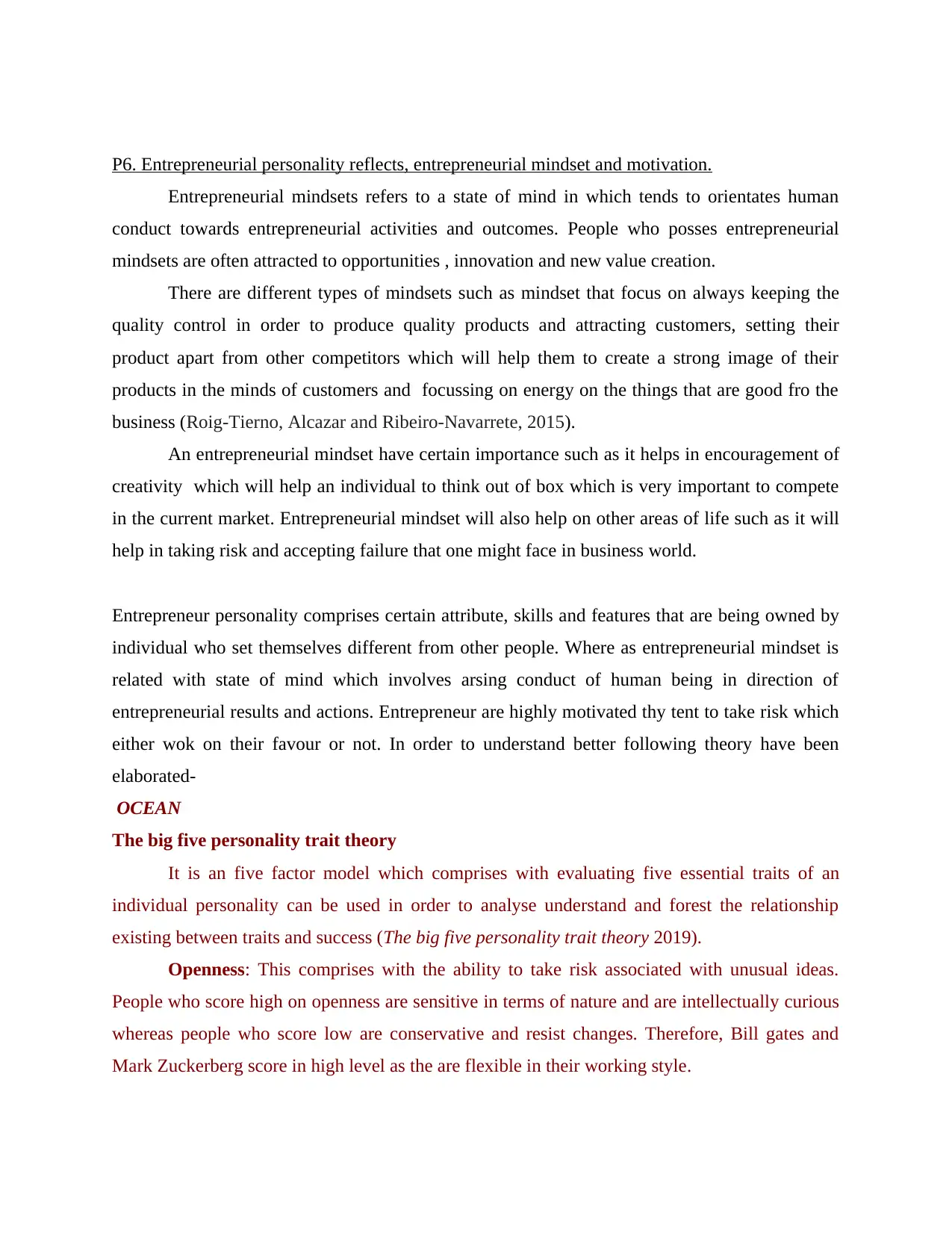
P6. Entrepreneurial personality reflects, entrepreneurial mindset and motivation.
Entrepreneurial mindsets refers to a state of mind in which tends to orientates human
conduct towards entrepreneurial activities and outcomes. People who posses entrepreneurial
mindsets are often attracted to opportunities , innovation and new value creation.
There are different types of mindsets such as mindset that focus on always keeping the
quality control in order to produce quality products and attracting customers, setting their
product apart from other competitors which will help them to create a strong image of their
products in the minds of customers and focussing on energy on the things that are good fro the
business (Roig-Tierno, Alcazar and Ribeiro-Navarrete, 2015).
An entrepreneurial mindset have certain importance such as it helps in encouragement of
creativity which will help an individual to think out of box which is very important to compete
in the current market. Entrepreneurial mindset will also help on other areas of life such as it will
help in taking risk and accepting failure that one might face in business world.
Entrepreneur personality comprises certain attribute, skills and features that are being owned by
individual who set themselves different from other people. Where as entrepreneurial mindset is
related with state of mind which involves arsing conduct of human being in direction of
entrepreneurial results and actions. Entrepreneur are highly motivated thy tent to take risk which
either wok on their favour or not. In order to understand better following theory have been
elaborated-
OCEAN
The big five personality trait theory
It is an five factor model which comprises with evaluating five essential traits of an
individual personality can be used in order to analyse understand and forest the relationship
existing between traits and success (The big five personality trait theory 2019).
Openness: This comprises with the ability to take risk associated with unusual ideas.
People who score high on openness are sensitive in terms of nature and are intellectually curious
whereas people who score low are conservative and resist changes. Therefore, Bill gates and
Mark Zuckerberg score in high level as the are flexible in their working style.
Entrepreneurial mindsets refers to a state of mind in which tends to orientates human
conduct towards entrepreneurial activities and outcomes. People who posses entrepreneurial
mindsets are often attracted to opportunities , innovation and new value creation.
There are different types of mindsets such as mindset that focus on always keeping the
quality control in order to produce quality products and attracting customers, setting their
product apart from other competitors which will help them to create a strong image of their
products in the minds of customers and focussing on energy on the things that are good fro the
business (Roig-Tierno, Alcazar and Ribeiro-Navarrete, 2015).
An entrepreneurial mindset have certain importance such as it helps in encouragement of
creativity which will help an individual to think out of box which is very important to compete
in the current market. Entrepreneurial mindset will also help on other areas of life such as it will
help in taking risk and accepting failure that one might face in business world.
Entrepreneur personality comprises certain attribute, skills and features that are being owned by
individual who set themselves different from other people. Where as entrepreneurial mindset is
related with state of mind which involves arsing conduct of human being in direction of
entrepreneurial results and actions. Entrepreneur are highly motivated thy tent to take risk which
either wok on their favour or not. In order to understand better following theory have been
elaborated-
OCEAN
The big five personality trait theory
It is an five factor model which comprises with evaluating five essential traits of an
individual personality can be used in order to analyse understand and forest the relationship
existing between traits and success (The big five personality trait theory 2019).
Openness: This comprises with the ability to take risk associated with unusual ideas.
People who score high on openness are sensitive in terms of nature and are intellectually curious
whereas people who score low are conservative and resist changes. Therefore, Bill gates and
Mark Zuckerberg score in high level as the are flexible in their working style.
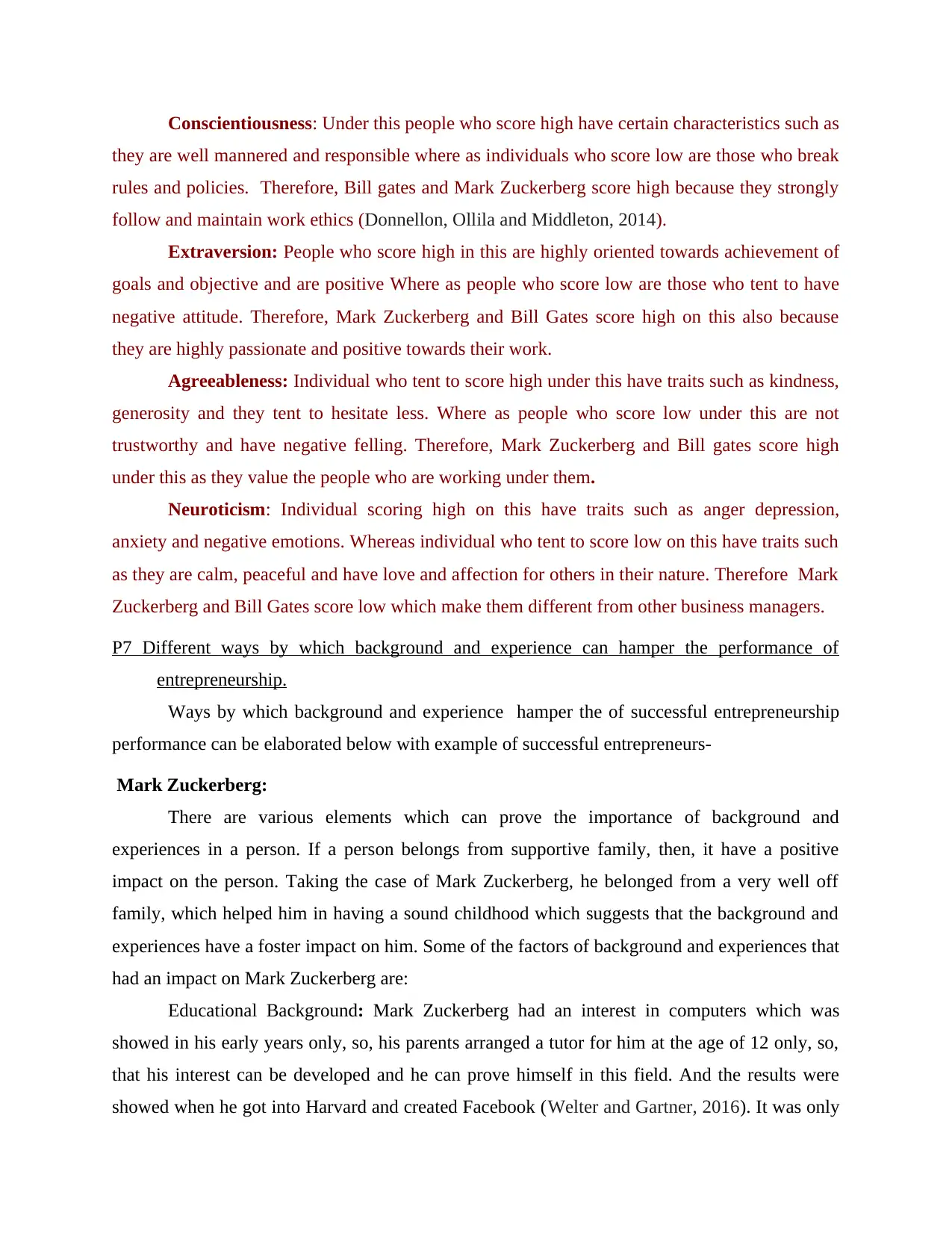
Conscientiousness: Under this people who score high have certain characteristics such as
they are well mannered and responsible where as individuals who score low are those who break
rules and policies. Therefore, Bill gates and Mark Zuckerberg score high because they strongly
follow and maintain work ethics (Donnellon, Ollila and Middleton, 2014).
Extraversion: People who score high in this are highly oriented towards achievement of
goals and objective and are positive Where as people who score low are those who tent to have
negative attitude. Therefore, Mark Zuckerberg and Bill Gates score high on this also because
they are highly passionate and positive towards their work.
Agreeableness: Individual who tent to score high under this have traits such as kindness,
generosity and they tent to hesitate less. Where as people who score low under this are not
trustworthy and have negative felling. Therefore, Mark Zuckerberg and Bill gates score high
under this as they value the people who are working under them.
Neuroticism: Individual scoring high on this have traits such as anger depression,
anxiety and negative emotions. Whereas individual who tent to score low on this have traits such
as they are calm, peaceful and have love and affection for others in their nature. Therefore Mark
Zuckerberg and Bill Gates score low which make them different from other business managers.
P7 Different ways by which background and experience can hamper the performance of
entrepreneurship.
Ways by which background and experience hamper the of successful entrepreneurship
performance can be elaborated below with example of successful entrepreneurs-
Mark Zuckerberg:
There are various elements which can prove the importance of background and
experiences in a person. If a person belongs from supportive family, then, it have a positive
impact on the person. Taking the case of Mark Zuckerberg, he belonged from a very well off
family, which helped him in having a sound childhood which suggests that the background and
experiences have a foster impact on him. Some of the factors of background and experiences that
had an impact on Mark Zuckerberg are:
Educational Background: Mark Zuckerberg had an interest in computers which was
showed in his early years only, so, his parents arranged a tutor for him at the age of 12 only, so,
that his interest can be developed and he can prove himself in this field. And the results were
showed when he got into Harvard and created Facebook (Welter and Gartner, 2016). It was only
they are well mannered and responsible where as individuals who score low are those who break
rules and policies. Therefore, Bill gates and Mark Zuckerberg score high because they strongly
follow and maintain work ethics (Donnellon, Ollila and Middleton, 2014).
Extraversion: People who score high in this are highly oriented towards achievement of
goals and objective and are positive Where as people who score low are those who tent to have
negative attitude. Therefore, Mark Zuckerberg and Bill Gates score high on this also because
they are highly passionate and positive towards their work.
Agreeableness: Individual who tent to score high under this have traits such as kindness,
generosity and they tent to hesitate less. Where as people who score low under this are not
trustworthy and have negative felling. Therefore, Mark Zuckerberg and Bill gates score high
under this as they value the people who are working under them.
Neuroticism: Individual scoring high on this have traits such as anger depression,
anxiety and negative emotions. Whereas individual who tent to score low on this have traits such
as they are calm, peaceful and have love and affection for others in their nature. Therefore Mark
Zuckerberg and Bill Gates score low which make them different from other business managers.
P7 Different ways by which background and experience can hamper the performance of
entrepreneurship.
Ways by which background and experience hamper the of successful entrepreneurship
performance can be elaborated below with example of successful entrepreneurs-
Mark Zuckerberg:
There are various elements which can prove the importance of background and
experiences in a person. If a person belongs from supportive family, then, it have a positive
impact on the person. Taking the case of Mark Zuckerberg, he belonged from a very well off
family, which helped him in having a sound childhood which suggests that the background and
experiences have a foster impact on him. Some of the factors of background and experiences that
had an impact on Mark Zuckerberg are:
Educational Background: Mark Zuckerberg had an interest in computers which was
showed in his early years only, so, his parents arranged a tutor for him at the age of 12 only, so,
that his interest can be developed and he can prove himself in this field. And the results were
showed when he got into Harvard and created Facebook (Welter and Gartner, 2016). It was only
Secure Best Marks with AI Grader
Need help grading? Try our AI Grader for instant feedback on your assignments.
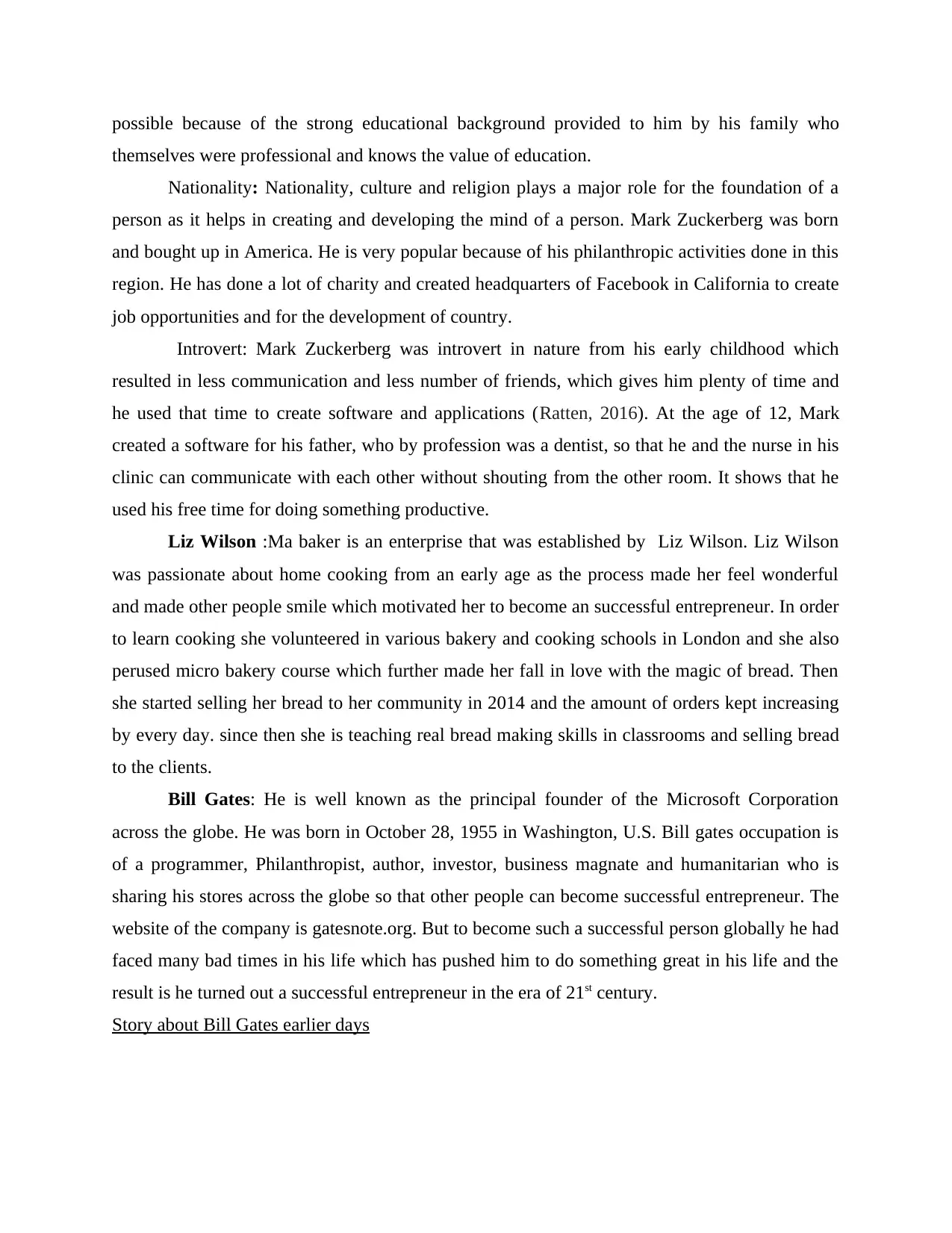
possible because of the strong educational background provided to him by his family who
themselves were professional and knows the value of education.
Nationality: Nationality, culture and religion plays a major role for the foundation of a
person as it helps in creating and developing the mind of a person. Mark Zuckerberg was born
and bought up in America. He is very popular because of his philanthropic activities done in this
region. He has done a lot of charity and created headquarters of Facebook in California to create
job opportunities and for the development of country.
Introvert: Mark Zuckerberg was introvert in nature from his early childhood which
resulted in less communication and less number of friends, which gives him plenty of time and
he used that time to create software and applications (Ratten, 2016). At the age of 12, Mark
created a software for his father, who by profession was a dentist, so that he and the nurse in his
clinic can communicate with each other without shouting from the other room. It shows that he
used his free time for doing something productive.
Liz Wilson :Ma baker is an enterprise that was established by Liz Wilson. Liz Wilson
was passionate about home cooking from an early age as the process made her feel wonderful
and made other people smile which motivated her to become an successful entrepreneur. In order
to learn cooking she volunteered in various bakery and cooking schools in London and she also
perused micro bakery course which further made her fall in love with the magic of bread. Then
she started selling her bread to her community in 2014 and the amount of orders kept increasing
by every day. since then she is teaching real bread making skills in classrooms and selling bread
to the clients.
Bill Gates: He is well known as the principal founder of the Microsoft Corporation
across the globe. He was born in October 28, 1955 in Washington, U.S. Bill gates occupation is
of a programmer, Philanthropist, author, investor, business magnate and humanitarian who is
sharing his stores across the globe so that other people can become successful entrepreneur. The
website of the company is gatesnote.org. But to become such a successful person globally he had
faced many bad times in his life which has pushed him to do something great in his life and the
result is he turned out a successful entrepreneur in the era of 21st century.
Story about Bill Gates earlier days
themselves were professional and knows the value of education.
Nationality: Nationality, culture and religion plays a major role for the foundation of a
person as it helps in creating and developing the mind of a person. Mark Zuckerberg was born
and bought up in America. He is very popular because of his philanthropic activities done in this
region. He has done a lot of charity and created headquarters of Facebook in California to create
job opportunities and for the development of country.
Introvert: Mark Zuckerberg was introvert in nature from his early childhood which
resulted in less communication and less number of friends, which gives him plenty of time and
he used that time to create software and applications (Ratten, 2016). At the age of 12, Mark
created a software for his father, who by profession was a dentist, so that he and the nurse in his
clinic can communicate with each other without shouting from the other room. It shows that he
used his free time for doing something productive.
Liz Wilson :Ma baker is an enterprise that was established by Liz Wilson. Liz Wilson
was passionate about home cooking from an early age as the process made her feel wonderful
and made other people smile which motivated her to become an successful entrepreneur. In order
to learn cooking she volunteered in various bakery and cooking schools in London and she also
perused micro bakery course which further made her fall in love with the magic of bread. Then
she started selling her bread to her community in 2014 and the amount of orders kept increasing
by every day. since then she is teaching real bread making skills in classrooms and selling bread
to the clients.
Bill Gates: He is well known as the principal founder of the Microsoft Corporation
across the globe. He was born in October 28, 1955 in Washington, U.S. Bill gates occupation is
of a programmer, Philanthropist, author, investor, business magnate and humanitarian who is
sharing his stores across the globe so that other people can become successful entrepreneur. The
website of the company is gatesnote.org. But to become such a successful person globally he had
faced many bad times in his life which has pushed him to do something great in his life and the
result is he turned out a successful entrepreneur in the era of 21st century.
Story about Bill Gates earlier days
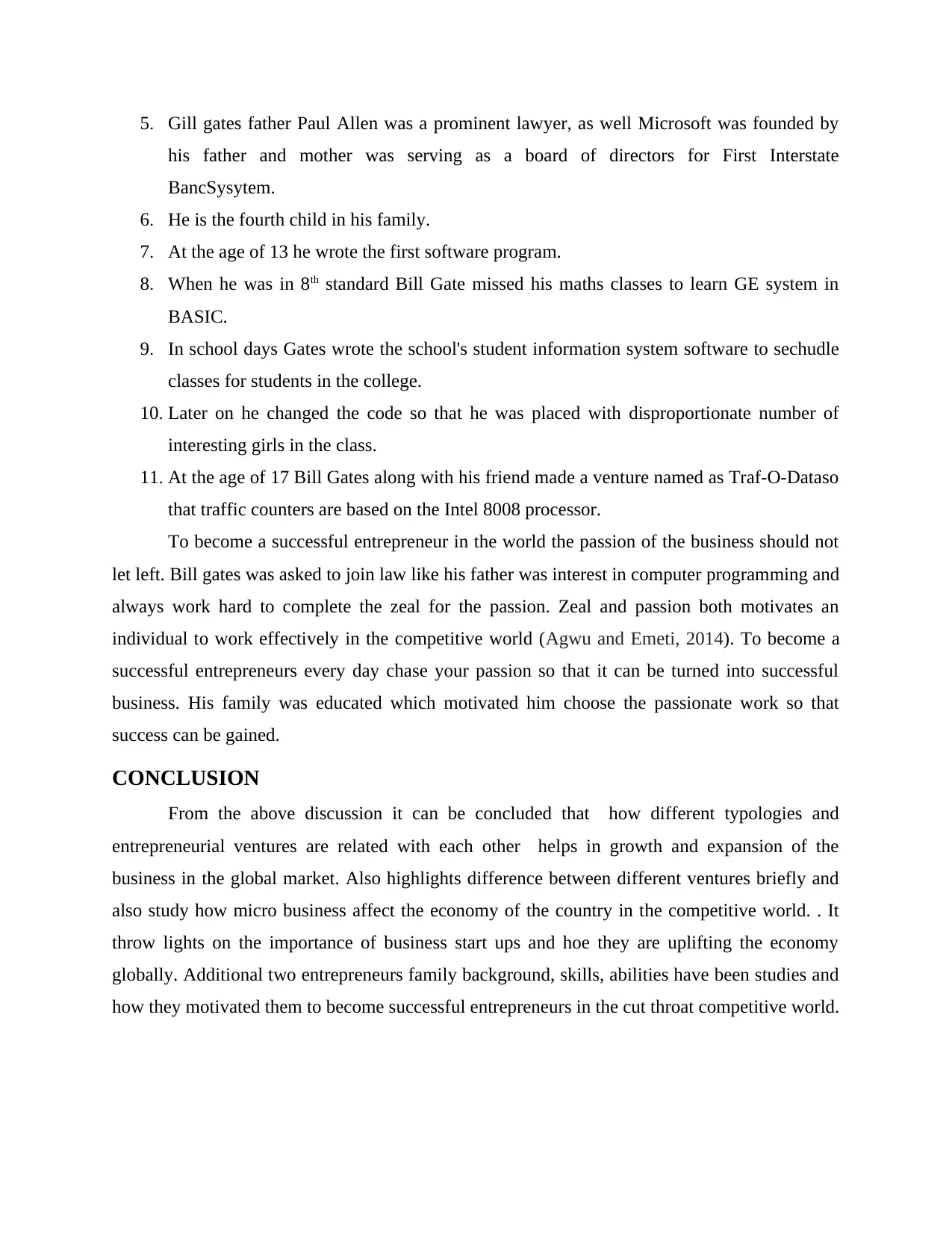
5. Gill gates father Paul Allen was a prominent lawyer, as well Microsoft was founded by
his father and mother was serving as a board of directors for First Interstate
BancSysytem.
6. He is the fourth child in his family.
7. At the age of 13 he wrote the first software program.
8. When he was in 8th standard Bill Gate missed his maths classes to learn GE system in
BASIC.
9. In school days Gates wrote the school's student information system software to sechudle
classes for students in the college.
10. Later on he changed the code so that he was placed with disproportionate number of
interesting girls in the class.
11. At the age of 17 Bill Gates along with his friend made a venture named as Traf-O-Dataso
that traffic counters are based on the Intel 8008 processor.
To become a successful entrepreneur in the world the passion of the business should not
let left. Bill gates was asked to join law like his father was interest in computer programming and
always work hard to complete the zeal for the passion. Zeal and passion both motivates an
individual to work effectively in the competitive world (Agwu and Emeti, 2014). To become a
successful entrepreneurs every day chase your passion so that it can be turned into successful
business. His family was educated which motivated him choose the passionate work so that
success can be gained.
CONCLUSION
From the above discussion it can be concluded that how different typologies and
entrepreneurial ventures are related with each other helps in growth and expansion of the
business in the global market. Also highlights difference between different ventures briefly and
also study how micro business affect the economy of the country in the competitive world. . It
throw lights on the importance of business start ups and hoe they are uplifting the economy
globally. Additional two entrepreneurs family background, skills, abilities have been studies and
how they motivated them to become successful entrepreneurs in the cut throat competitive world.
his father and mother was serving as a board of directors for First Interstate
BancSysytem.
6. He is the fourth child in his family.
7. At the age of 13 he wrote the first software program.
8. When he was in 8th standard Bill Gate missed his maths classes to learn GE system in
BASIC.
9. In school days Gates wrote the school's student information system software to sechudle
classes for students in the college.
10. Later on he changed the code so that he was placed with disproportionate number of
interesting girls in the class.
11. At the age of 17 Bill Gates along with his friend made a venture named as Traf-O-Dataso
that traffic counters are based on the Intel 8008 processor.
To become a successful entrepreneur in the world the passion of the business should not
let left. Bill gates was asked to join law like his father was interest in computer programming and
always work hard to complete the zeal for the passion. Zeal and passion both motivates an
individual to work effectively in the competitive world (Agwu and Emeti, 2014). To become a
successful entrepreneurs every day chase your passion so that it can be turned into successful
business. His family was educated which motivated him choose the passionate work so that
success can be gained.
CONCLUSION
From the above discussion it can be concluded that how different typologies and
entrepreneurial ventures are related with each other helps in growth and expansion of the
business in the global market. Also highlights difference between different ventures briefly and
also study how micro business affect the economy of the country in the competitive world. . It
throw lights on the importance of business start ups and hoe they are uplifting the economy
globally. Additional two entrepreneurs family background, skills, abilities have been studies and
how they motivated them to become successful entrepreneurs in the cut throat competitive world.

Paraphrase This Document
Need a fresh take? Get an instant paraphrase of this document with our AI Paraphraser
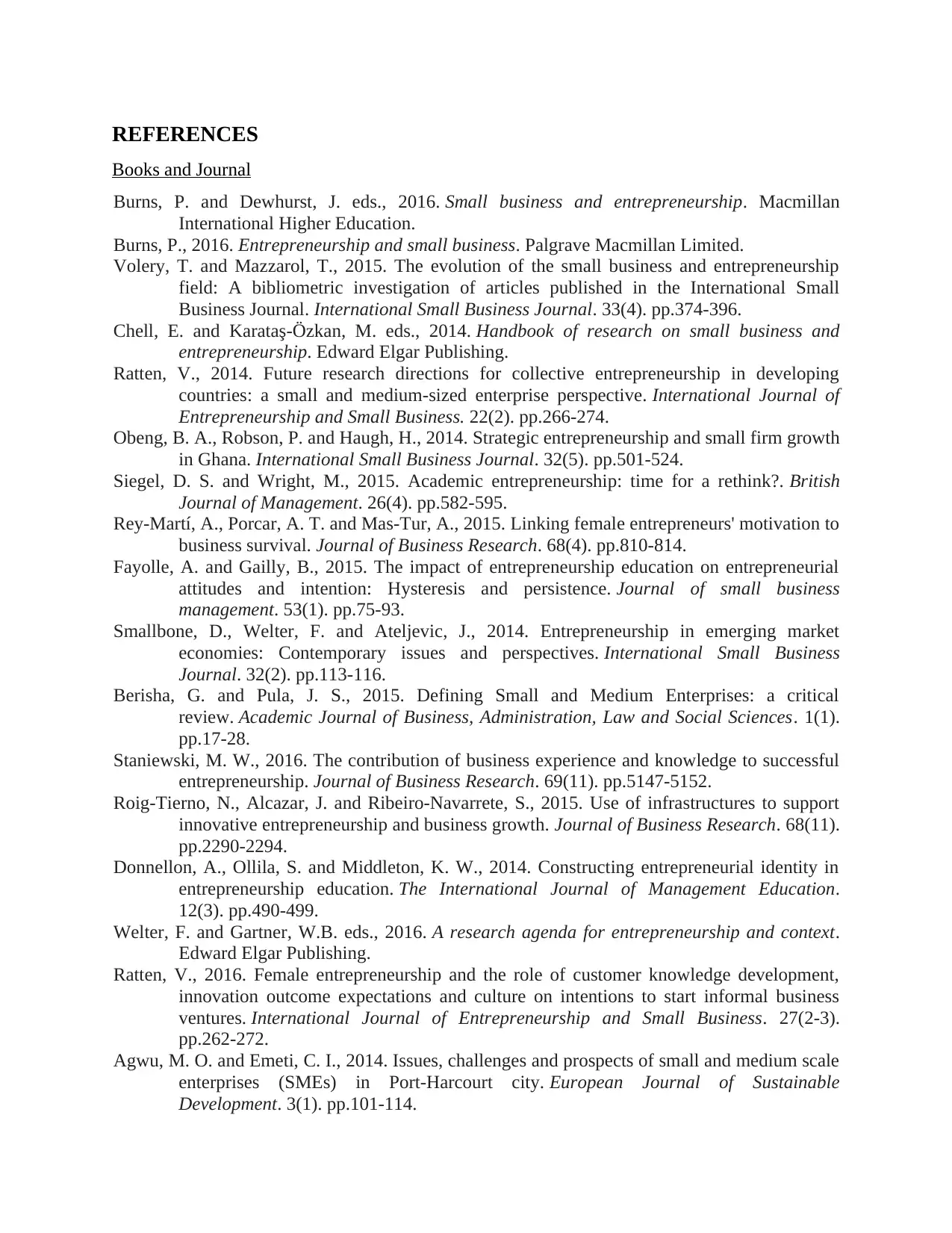
REFERENCES
Books and Journal
Burns, P. and Dewhurst, J. eds., 2016. Small business and entrepreneurship. Macmillan
International Higher Education.
Burns, P., 2016. Entrepreneurship and small business. Palgrave Macmillan Limited.
Volery, T. and Mazzarol, T., 2015. The evolution of the small business and entrepreneurship
field: A bibliometric investigation of articles published in the International Small
Business Journal. International Small Business Journal. 33(4). pp.374-396.
Chell, E. and Karataş-Özkan, M. eds., 2014. Handbook of research on small business and
entrepreneurship. Edward Elgar Publishing.
Ratten, V., 2014. Future research directions for collective entrepreneurship in developing
countries: a small and medium-sized enterprise perspective. International Journal of
Entrepreneurship and Small Business. 22(2). pp.266-274.
Obeng, B. A., Robson, P. and Haugh, H., 2014. Strategic entrepreneurship and small firm growth
in Ghana. International Small Business Journal. 32(5). pp.501-524.
Siegel, D. S. and Wright, M., 2015. Academic entrepreneurship: time for a rethink?. British
Journal of Management. 26(4). pp.582-595.
Rey-Martí, A., Porcar, A. T. and Mas-Tur, A., 2015. Linking female entrepreneurs' motivation to
business survival. Journal of Business Research. 68(4). pp.810-814.
Fayolle, A. and Gailly, B., 2015. The impact of entrepreneurship education on entrepreneurial
attitudes and intention: Hysteresis and persistence. Journal of small business
management. 53(1). pp.75-93.
Smallbone, D., Welter, F. and Ateljevic, J., 2014. Entrepreneurship in emerging market
economies: Contemporary issues and perspectives. International Small Business
Journal. 32(2). pp.113-116.
Berisha, G. and Pula, J. S., 2015. Defining Small and Medium Enterprises: a critical
review. Academic Journal of Business, Administration, Law and Social Sciences. 1(1).
pp.17-28.
Staniewski, M. W., 2016. The contribution of business experience and knowledge to successful
entrepreneurship. Journal of Business Research. 69(11). pp.5147-5152.
Roig-Tierno, N., Alcazar, J. and Ribeiro-Navarrete, S., 2015. Use of infrastructures to support
innovative entrepreneurship and business growth. Journal of Business Research. 68(11).
pp.2290-2294.
Donnellon, A., Ollila, S. and Middleton, K. W., 2014. Constructing entrepreneurial identity in
entrepreneurship education. The International Journal of Management Education.
12(3). pp.490-499.
Welter, F. and Gartner, W.B. eds., 2016. A research agenda for entrepreneurship and context.
Edward Elgar Publishing.
Ratten, V., 2016. Female entrepreneurship and the role of customer knowledge development,
innovation outcome expectations and culture on intentions to start informal business
ventures. International Journal of Entrepreneurship and Small Business. 27(2-3).
pp.262-272.
Agwu, M. O. and Emeti, C. I., 2014. Issues, challenges and prospects of small and medium scale
enterprises (SMEs) in Port-Harcourt city. European Journal of Sustainable
Development. 3(1). pp.101-114.
Books and Journal
Burns, P. and Dewhurst, J. eds., 2016. Small business and entrepreneurship. Macmillan
International Higher Education.
Burns, P., 2016. Entrepreneurship and small business. Palgrave Macmillan Limited.
Volery, T. and Mazzarol, T., 2015. The evolution of the small business and entrepreneurship
field: A bibliometric investigation of articles published in the International Small
Business Journal. International Small Business Journal. 33(4). pp.374-396.
Chell, E. and Karataş-Özkan, M. eds., 2014. Handbook of research on small business and
entrepreneurship. Edward Elgar Publishing.
Ratten, V., 2014. Future research directions for collective entrepreneurship in developing
countries: a small and medium-sized enterprise perspective. International Journal of
Entrepreneurship and Small Business. 22(2). pp.266-274.
Obeng, B. A., Robson, P. and Haugh, H., 2014. Strategic entrepreneurship and small firm growth
in Ghana. International Small Business Journal. 32(5). pp.501-524.
Siegel, D. S. and Wright, M., 2015. Academic entrepreneurship: time for a rethink?. British
Journal of Management. 26(4). pp.582-595.
Rey-Martí, A., Porcar, A. T. and Mas-Tur, A., 2015. Linking female entrepreneurs' motivation to
business survival. Journal of Business Research. 68(4). pp.810-814.
Fayolle, A. and Gailly, B., 2015. The impact of entrepreneurship education on entrepreneurial
attitudes and intention: Hysteresis and persistence. Journal of small business
management. 53(1). pp.75-93.
Smallbone, D., Welter, F. and Ateljevic, J., 2014. Entrepreneurship in emerging market
economies: Contemporary issues and perspectives. International Small Business
Journal. 32(2). pp.113-116.
Berisha, G. and Pula, J. S., 2015. Defining Small and Medium Enterprises: a critical
review. Academic Journal of Business, Administration, Law and Social Sciences. 1(1).
pp.17-28.
Staniewski, M. W., 2016. The contribution of business experience and knowledge to successful
entrepreneurship. Journal of Business Research. 69(11). pp.5147-5152.
Roig-Tierno, N., Alcazar, J. and Ribeiro-Navarrete, S., 2015. Use of infrastructures to support
innovative entrepreneurship and business growth. Journal of Business Research. 68(11).
pp.2290-2294.
Donnellon, A., Ollila, S. and Middleton, K. W., 2014. Constructing entrepreneurial identity in
entrepreneurship education. The International Journal of Management Education.
12(3). pp.490-499.
Welter, F. and Gartner, W.B. eds., 2016. A research agenda for entrepreneurship and context.
Edward Elgar Publishing.
Ratten, V., 2016. Female entrepreneurship and the role of customer knowledge development,
innovation outcome expectations and culture on intentions to start informal business
ventures. International Journal of Entrepreneurship and Small Business. 27(2-3).
pp.262-272.
Agwu, M. O. and Emeti, C. I., 2014. Issues, challenges and prospects of small and medium scale
enterprises (SMEs) in Port-Harcourt city. European Journal of Sustainable
Development. 3(1). pp.101-114.
1 out of 20
Related Documents
Your All-in-One AI-Powered Toolkit for Academic Success.
+13062052269
info@desklib.com
Available 24*7 on WhatsApp / Email
![[object Object]](/_next/static/media/star-bottom.7253800d.svg)
Unlock your academic potential
© 2024 | Zucol Services PVT LTD | All rights reserved.




